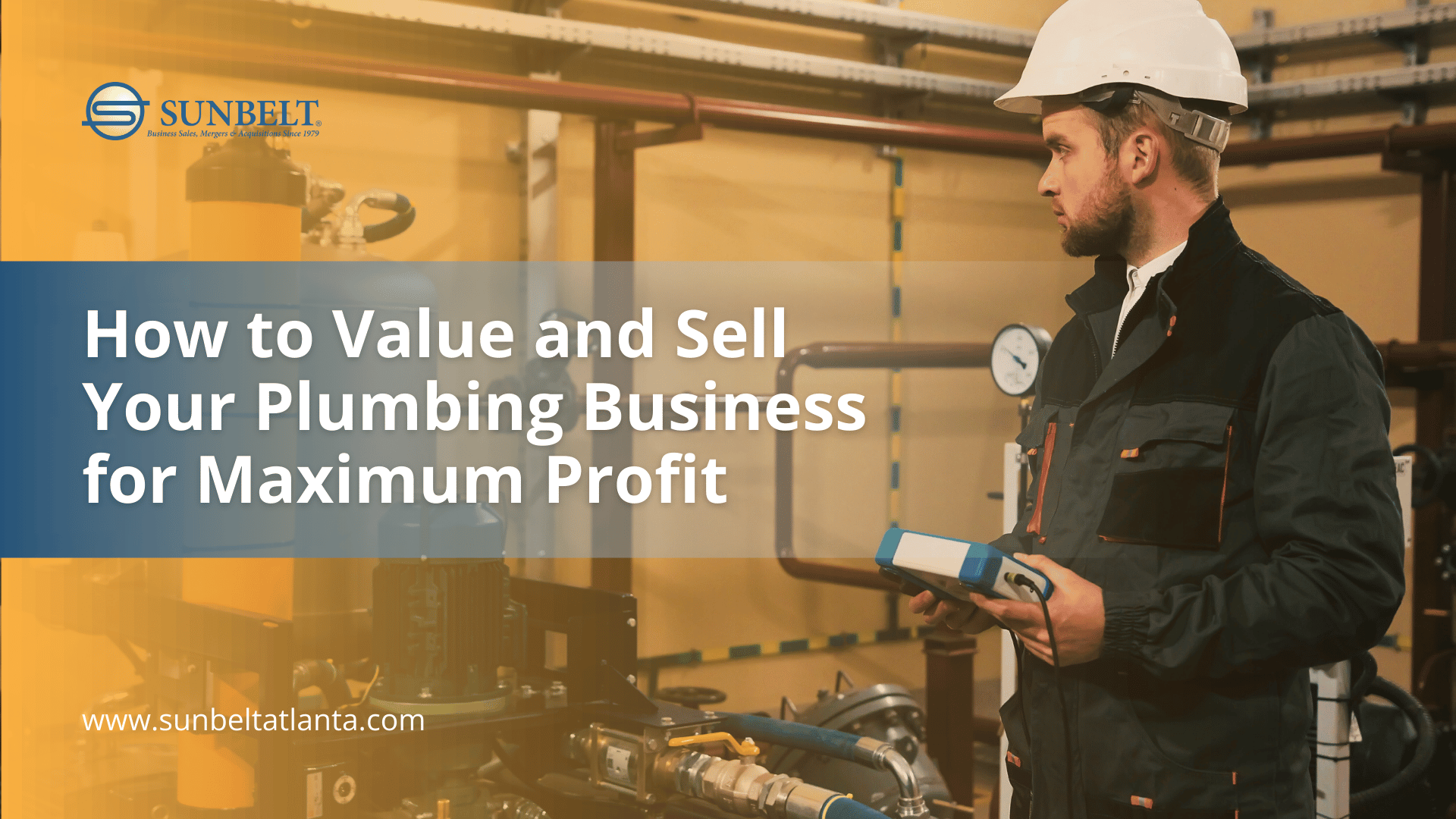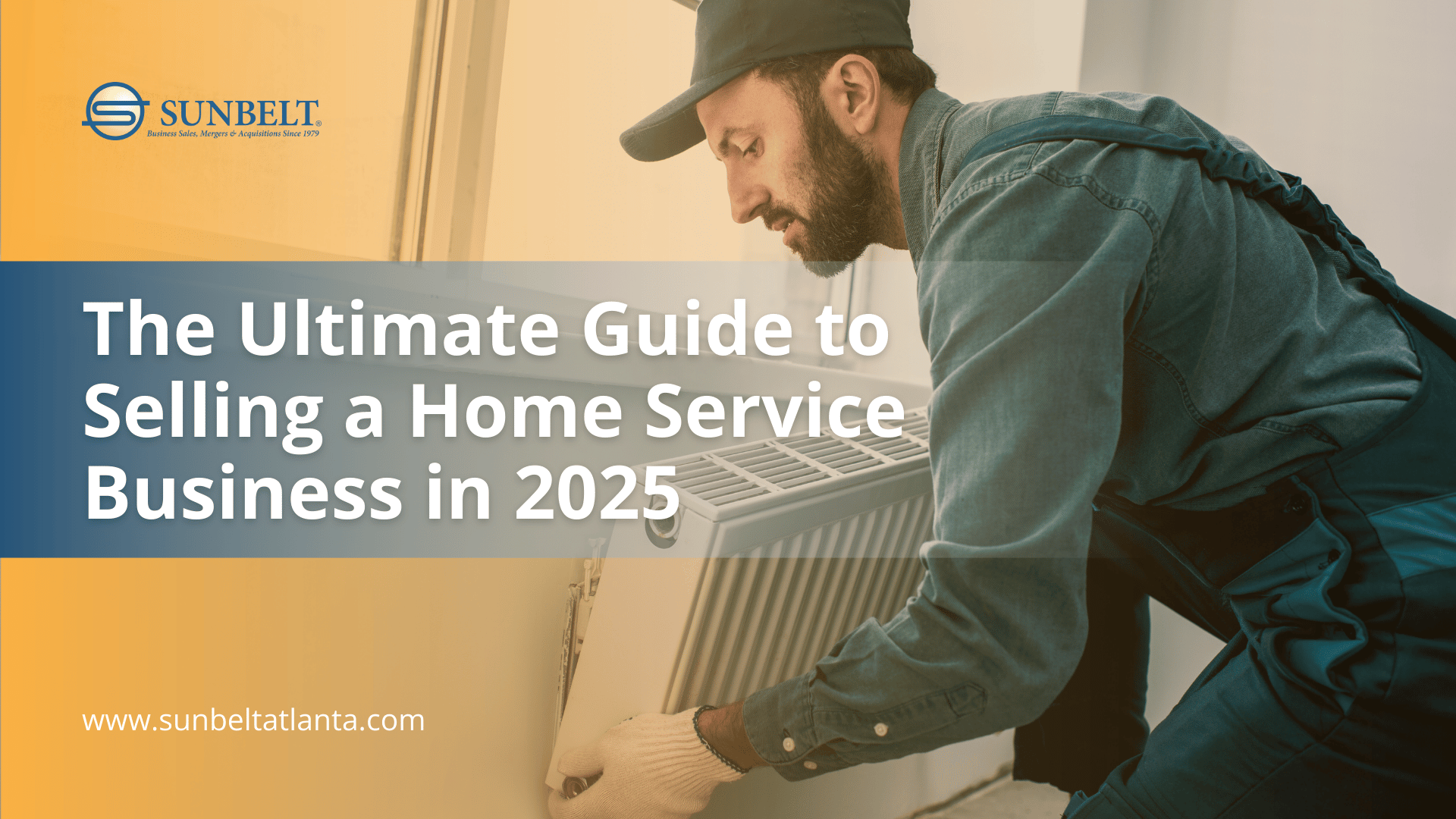Selling a business is a major decision with long-term consequences. If you're planning to exit within the next one to three years, the real question is whether you’ve started preparing early enough to avoid costly mistakes.
10 min read
How to Build an Exit Timeline That Maximizes Your Business Sale
By Doreen Morgan on Jan 19, 2026 9:30:00 AM
11 min read
Want to Sell Your Business at Full Value? Start With Clean Financials
By Doreen Morgan on Jan 12, 2026 3:30:00 PM
Buyers do not make offers based on hope. They make decisions based on your financials. If the numbers are weak, unclear, or disorganized, the deal will fall apart fast.
9 min read
Business Valuation Trends for 2026: Get Ahead of What Buyers Want
By Doreen Morgan on Jan 5, 2026 10:00:00 AM
If you're planning to sell your business in 2026, start with a tougher question: What will buyers actually pay, and why?
Topics: Business Valuations
8 min read
Deal Structure Guide for Business Owners: How Sellers Maximize Profit in M&A
By Doreen Morgan on Dec 29, 2025 6:30:00 AM
When you decide to sell a business, your focus instantly lands on one number: the valuation. But experienced business owners and M&A advisors know the "headline price" is only half the story. The real number—the amount you actually deposit in your bank account—is determined by the deal structure.
This guide is for sellers who want to move beyond a simple valuation and understand how to strategically structure a business sale. We will explore how the structure of the deal, from tax liabilities to post-sale obligations, dictates your final payout. Understanding these common deal structures is the key to maximizing your profit during a merger or acquisition. Sellers need this knowledge before the negotiation begins.
Beyond the Sticker Price: Why Deal Structure Dictates Your Net Profit
A $10 million offer is not always $10 million. The way that purchase price is paid, the tax treatment it receives, and the liabilities you retain can dramatically shrink your net proceeds. The chosen structure outlines the legal and financial mechanics of the transaction, impacting everything from capital gains tax to future risk.
Working capital peg (cash‑free, debt‑free): Most offers are presented on a cash‑free, debt‑free basis with a normalized net working capital (NWC) peg. At closing, your cash is excluded and your debt is paid off, then the closing price is adjusted up or down versus the agreed NWC peg. Unclear pegs or weak baselines can reduce cash at close. Build a 12–24 month NWC baseline (seasonality included) before you market the business, and make sure the LOI defines method, components, and dispute process.
The Critical Role of Tax Implications
Taxes are the single biggest factor in deal structuring. An asset sale, for example, often results in a portion of the proceeds being taxed at higher ordinary income rates for the seller, while the buyer gets a tax-advantageous "step-up" in the basis of the assets. Conversely, a stock sale typically allows the seller to treat the entire payout as a long-term capital gain, resulting in a much lower tax bill. As of mid-2025, the gap between long-term capital gains rates and top ordinary income rates can be substantial, making this the most important negotiation point for sellers.
Tax guardrails (quick scan): For asset deals, purchase price allocation follows IRC §1060; the portion allocated to goodwill is generally capital gain to the seller (ordinary for some C‑corp contexts) and amortizable to the buyer. State tax treatment can vary by jurisdiction. Always model after‑tax, after‑escrow, after‑peg proceeds when comparing offers. For a concise overview of §1060 allocation concepts, see this Practical Law primer (subscription may be required): IRC §1060 asset acquisition allocation overview.
Allocating and Mitigating Post-Sale Liability
The deal structure also defines what you are responsible for after you close the deal. In a stock sale, the buyer inherits the entire legal entity, including all its past, present, and unknown liabilities. In an asset sale, the buyer only purchases the specific assets they want, leaving the seller’s original entity (and its liabilities) behind. This makes an asset purchase far less risky for the buyer and, by extension, potentially riskier for the seller unless proper indemnifications are negotiated.
The Two Foundational Structures: Asset Sale vs. Stock Sale
Nearly every M&A transaction boils down to one of two common structures: an asset sale or a stock sale. The buyer and seller almost always have opposing preferences. Understanding the pros and cons of each is the first step in crafting a deal that works for you.
The Asset Sale: A Buyer's Preference
In an asset sale, the buyer purchases specific assets and liabilities from your company—like equipment, inventory, and customer lists—but not the company (legal entity) itself. Buyers love this structure because they can "cherry-pick" assets, leave unknown liabilities with the seller, and get a "step-up" in the tax basis of the assets they purchase. This step-up allows them to re-depreciate the assets, creating significant future tax shields for their new business.
The Stock Sale: A Seller's Preference
In a stock sale (or stock purchase), the buyer purchases the owner's shares of stock, acquiring the entire legal entity, including all its assets and liabilities. Sellers strongly prefer this structure for two primary reasons: tax and liability. The proceeds are typically treated as long-term capital gains (assuming the holding period is met), and all contingent liabilities (like old lawsuits or warranty claims) transfer to the buyer with the ownership of the business.
Navigating S-Corp Exceptions
For certain businesses, particularly S-Corporations, a special tax election called an IRC 338(h)(10) can offer a compromise. This election legally structures the transaction as a stock sale (good for the seller's liability) but allows it to be treated as an asset sale for tax purposes (good for the buyer's tax basis). This can be a powerful tool, but it requires careful analysis by an experienced M&A attorney and tax advisor to ensure the seller is compensated for any potential tax disadvantages.
Strategic Considerations: Structuring Tools to Bridge the Valuation Gap
What happens when you and the buyer are far apart on the valuation? The right deal structure can bridge that gap without either side feeling like they've 'lost' the negotiation. These tools are used to re-allocate risk and align incentives for the post-sale success of the business.
Using Seller Financing Strategically
Seller financing is when you, the seller, act as the bank for a portion of the purchase price, which the buyer pays back to you over time with interest. While this introduces risk (the buyer could default), it offers powerful advantages: it can increase the total sale price, generate ongoing interest income for you, and make the deal possible for a buyer who lacks full bank funding. A strategic seller will secure this note with the assets of the business, making it a less risky way to achieve a higher valuation.
Seller note hygiene: Document collateral and file a UCC‑1; define personal guaranties (if any); state interest, amortization, maturity, and covenants; attach default remedies; and align with senior lender via subordination/intercreditor terms. Clarify prepayment, cure periods, and whether the note accelerates on buyer sale or covenant breach.
Structuring Earn-Outs to Protect the Seller
An earn-out is a contingent payment (or payments) made to the seller post-sale if the business achieves specific, pre-defined performance milestones (like revenue or EBITDA targets). Buyers use earn-outs to reduce their upfront risk, but sellers should be cautious. A well-structured earn-out clearly defines the metrics, prevents the buyer from artificially suppressing performance, and may even include acceleration clauses if the business is sold again.
Earn‑out mechanics that matter: Define calculation methodology (GAAP vs. adjusted EBITDA and allowed add‑backs), governance covenants (no starve‑the‑business moves, reasonable funding, sales channel continuity), integration rules (no dumping costs into the target, no unfavorable transfer pricing), audit/inspection rights, caps/floors and clawbacks, plus acceleration on buyer resale, change of control, or material covenant breach. Tie timing and dispute resolution to the purchase agreement calendar.
The Role of Escrows and Holdbacks
Buyers will often demand that a portion of the purchase price (typically 8–15%) be held in an escrow account for 12–24 months. This money serves as a security deposit to cover any breaches of representations or warranties discovered during due diligence (e.g., an undisclosed liability). As a seller, your goal in the negotiation is to limit the amount, shorten the duration, and clearly define the exact conditions under which the buyer can make a claim against those funds.
Where R&W insurance (RWI) fits: In larger deals, RWI can reduce the escrow size/duration and shift a portion of indemnity risk to an insurer (subject to exclusions and a retention). Pricing and availability vary; your M&A attorney and broker can advise whether RWI makes economic sense for your transaction.
For additional negotiation and legal insights, explore our professional M&A advisor resources.
A Case Note: How Structure Changed the Net Payout
Real-world examples clearly illustrate the power of good deal structuring. Consider a manufacturing business we'll call 'TechFab Inc.' The business owner received two competing offers, and the 'winning' offer wasn't the one with the highest price.
Offer A: The "High Price" Asset Sale
Offer A was for $12 million, structured as an asset sale. This was the buyer's preference. However, after tax analysis, nearly $4 million of the purchase price would be allocated to assets taxed as ordinary income (like inventory and accounts receivable), and the seller would retain the liability for an old environmental review. The seller's net, post-tax payout was projected to be approximately $7.8 million.
Offer B: The "Strategic" Stock Sale
Offer B was for $10.5 million—a full $1.5 million lower—but was structured as a stock sale. The buyer agreed to this structure in exchange for a lower price. The entire $10.5 million was treated as a capital gain, and all liabilities (known and unknown) transferred to the buyer. The seller's net, post-tax payout was approximately $8.4 million, and they had a clean break from the business. The 'lower' offer put an extra $600,000 in the seller's pocket with zero post-sale risk.
Building Your Deal Team for M&A Success
Thinking about selling your business without an experienced M&A advisor is like going to court without a lawyer. The buyer, especially a private equity firm or strategic competitor, will have a team of experts. You must have your own deal team to level the playing field and protect your interests.
The Role of Your M&A Advisor
Your M&A advisor (or business broker) is the quarterback of the sale. They manage the entire M&A process, from valuation and marketing to finding qualified buyers and leading the negotiation on deal terms. A good advisor creates a competitive environment among multiple buyers, which gives you the leverage needed to demand a favorable deal structure, not just a high price. Their primary role is as your chief strategist in crafting a deal that maximizes your net profit.
Why You Need an Experienced M&A Attorney and Tax Professional
Do not use your general business lawyer for an M&A transaction. You need an experienced M&A attorney who specializes in transaction structure, due diligence, and purchase agreements. They draft the legal language that protects you from post-sale liability and ensures the deal terms are ironclad. Similarly, a CPA or tax professional with M&A experience will model the tax implications of every offer, allowing you to compare deals based on your actual net payout.
Conclusion: Structure is the Key to Your Legacy
When selling your business, the valuation gets the headlines, but the deal structure defines your success. Every element—from the asset vs. stock choice to the terms of an earn-out—is a negotiating point that directly impacts your final payout and future risk. The right deal structure aligns with your strategic goals, whether that's maximizing cash at close, ensuring a clean exit, or securing a legacy for your employees.
Take Control of Your Exit
Don't wait for a buyer to dictate the terms to you. By understanding these strategic considerations before you go to market, you and your deal team can proactively frame the structure you want. This approach puts you in control of the negotiation from day one. If you're thinking about selling, start the conversation with an expert who understands how to build a deal for the seller.
Schedule Your Deal-Structuring Consultation
The difference between a good exit and a great one is in the details of the M&A deal structure. Our team at Sunbelt Atlanta has guided hundreds of business owners through this process, focusing on maximizing net proceeds, not just the sale price. Schedule a confidential, no-obligation deal-structuring consultation today to find out how we can structure your sale for maximum profit.
8 min read
Future-Proofing Your Business for 2026 and Beyond: A Step-by-Step Guide
By Doreen Morgan on Dec 22, 2025 6:59:59 AM
The year 2026 feels distant, but in the world of business valuation, it's already here. For small business owners, the landscape is transforming at a breakneck pace. Disruption from artificial intelligence (AI), geopolitical uncertainty, and workforce shifts isn't a future problem; it's a present-day reality that potential buyers are actively evaluating. Future-proofing your business isn't just a defensive strategy for survival. It's the single most important offensive strategy to maximize your company's value.
7 min read
Building a Business to Sell: How to Grow Your Company for a Future Acquisition
By Doreen Morgan on Dec 15, 2025 8:30:00 AM
Most entrepreneurs and startup founders are consumed by the immediate fires: product-market fit, raising capital, and accelerating growth. The "exit" is a distant, abstract concept—something to worry about years down the road. This is a common and costly mistake. Building a business to sell isn't about giving up; it's about building a better business. It means creating a company that is profitable, scalable, and can thrive without you, a concept popularized by authors like John Warrillow.
9 min read
How to Secure Funding to Buy a Franchise: A Guide to Your Financing Options
By Doreen Morgan on Dec 8, 2025 10:00:01 AM
You’ve identified a franchise opportunity, vetted the brand, and are ready to become a business owner. The last major hurdle is securing the capital. Financing a franchise purchase is different from starting a business from scratch; lenders view a proven business model favorably, but the total investment, including franchise fees and working capital, can be substantial.
9 min read
How to Write a Confidential Information Memorandum (CIM): A Detailed Guide
By Doreen Morgan on Dec 1, 2025 5:30:00 AM
When you decide to sell your business, your initial "teaser" document may generate interest. But to turn that interest into concrete offers, qualified buyers who have signed a Non-Disclosure Agreement (NDA) will need a comprehensive look at your company. This is the role of the Confidential Information Memorandum (CIM). This document is the single most important piece of marketing in the sale process, acting as the bridge between a buyer's initial curiosity and their decision to submit a Letter of Intent (LOI).
At Sunbelt Atlanta, we have guided hundreds of business owners through the M&A sale process. We've seen firsthand that a well-prepared CIM—one that is professional, transparent, and compelling—is the pivot point for attracting multiple, high-quality bids. This detailed guide explains how to prepare a Confidential Information Memorandum that presents your business in the best possible light and compels serious buyers to take the next step.
What is a Confidential Information Memorandum (CIM) and Why Does it Matter?
A CIM, sometimes called an "offering memorandum" in investment banking circles, is a comprehensive document that provides detailed information about a business for sale. It should be only as long as needed to answer buyer questions concisely—often 30–60 pages in the lower‑middle market—with clarity prioritized over page count. It is only shared with prospective buyers who have been qualified and have executed a legal NDA.
The entire function of a CIM is to give a potential buyer enough information to understand your business model, operations, and financial performance, allowing them to justify your valuation and make an informed decision to pursue the deal.
The CIM's Role in the M&A Sale Process
The CIM sits at a critical juncture in the sell-side M&A process. The typical flow moves from initial outreach (the "Teaser") to qualification (the NDA), which then unlocks the CIM for deep exploration. A strong CIM builds momentum, answers 90% of a buyer's initial questions, and builds the competitive tension needed to drive up the price. A weak, confusing, or incomplete CIM stops the sale process cold, as buyers will move on to other, more professionally presented opportunities.
CIM vs. "The Teaser": Understanding the Difference
It is crucial not to confuse the CIM with the Teaser. The Teaser is a one-page, completely anonymous document used for initial marketing. It provides only high-level, non-identifying information (e.g., "A $15M revenue logistics company in the Southeast"). The CIM is the exact opposite; it is a "tell-all" document that includes your company's name, its precise location, detailed financial information, customer concentration data, and future strategic plans.
Why a Strong CIM is Non-Negotiable
A professionally prepared CIM is your first and best opportunity to tell your company's story your way, before a buyer begins their own deep due diligence. It establishes your credibility as a seller and anchors the entire valuation discussion. By presenting your financial performance with clear adjustments and highlighting specific growth opportunities, you frame the conversation around your business's future potential, not just its past tax returns.
The Key Components of a Winning Confidential Information Memorandum
While every CIM is tailored to the specific business, a professional investment banking or business broker-prepared document follows a proven structure. Each section builds on the last to create a complete and compelling picture of the investment opportunity. Omitting any of these key components of a CIM signals to buyers that you are either unprepared or, worse, hiding something.
1. The Executive Summary
This is the most critical page of the entire document. Many buyers, especially private equity groups and other buy-side roles, will read this summary and decide whether to invest the time in reading the other 50 pages. This section must concisely summarize the entire opportunity: the business model, key financial metrics (like TTM Revenue and Adjusted EBITDA), your unique selling proposition, and the most exciting growth opportunities. It is not an introduction; it is a complete summary of the investment thesis.
Executive Summary spec (what buyers scan first):
- TTM revenue & adjusted EBITDA (+ 3–5 year trend line)
- Moat in 3–5 bullets (why you win and keep winning)
- Top risks & mitigations (one line each)
- Customer/product concentration snapshot (top 5 customers %, top product %)
- 3 prioritized growth initiatives (with simple effort/impact cue)
- Transaction highlights (deal rationale, management continuity, desired structure if applicable)
2. Business Overview and Operations
This section details what the company actually does. It needs to include detailed information about your complete list of products and services, key customer segments, and the operational flow. For a manufacturing business, this would detail the equipment list, facility specifications, and production capacity. For a SaaS company, it would describe the technology stack, the development process, and intellectual property.
3. Market and Competitive Landscape
A prospective buyer isn't just acquiring your company; they are buying your specific position within its market. This section must define your Total Addressable Market (TAM), identify key industry trends (e.g., growth, consolidation, new technology), and provide an honest analysis of the competitive landscape. Most importantly, it must clearly articulate your "economic moat" or sustainable competitive advantage—why do customers choose you over the competition, and why will they continue to do so?
4. Unlocking Growth Opportunities
This is where you sell the "blue sky" and future potential. A sophisticated buyer needs to see how they can grow the business beyond its current state, as this upside is what justifies a premium valuation. Be specific. Instead of a vague statement like "expand marketing," detail a tangible plan: "Hire a two-person outside sales team to penetrate the adjacent healthcare vertical, a $50M untapped market." This presents a tremendous opportunity for a buyer to increase revenues.
5. Detailed Financial Information
This is the heart of the CIM and where buyers spend the most time. This section must include 3-5 years of historical financial statements (P&Ls and Balance Sheets). Most importantly, it must feature a detailed Adjusted EBITDA or Seller's Discretionary Earnings (SDE) schedule. This "recast" financial performance normalizes the P&L by adding back one-time expenses (like a lawsuit) and non-operational owner benefits (like personal auto expenses or excess salary) to show the true, recurring earning power a new owner can expect.
Data hygiene checklist (include or confirm):
- Monthly closes completed on a consistent schedule; tie‑outs to bank statements
- Working capital peg baseline and seasonality narrative
- Revenue recognition policy and any multi‑element arrangements disclosed
- Add‑back reconciliation (bridge from GAAP/SDE to adjusted EBITDA)
- Tax status (entity type, elections) and QoE status (planned/in progress/done)
- AR/AP aging and inventory methodology (FIFO/LIFO/standard)
6. Management Team and Personnel
A business's value is often tied to its people. This section should profile the key members of your management team (excluding the exiting owner, if applicable). Detail their roles, years of tenure, and specific areas of expertise. This gives a potential buyer confidence that the company's operations are not 100% dependent on the seller and that a skilled, motivated team will remain in place post-transaction.
7. Risks & Mitigations (Address Weaknesses Proactively)
Every business has warts. Name them and frame them so buyers don’t assume worse. For each material risk (e.g., customer concentration, single‑source suppliers, legacy systems, regulatory change), include a one‑line mitigation (e.g., diversification plan milestones, dual‑sourcing in progress, upgrade roadmap, compliance engagement) and any early results achieved.
Best Practices for Preparing a Confidential Information Memorandum
What buyers are really asking (quick map):
| CIM Section | Buyer Question Answered |
|---|---|
| Executive Summary | Is this worth my time? What’s the earnings power and moat? |
| Business & Operations | How does it work day‑to‑day? Is it scalable without the owner? |
| Market & Competition | Why you vs. others? What tailwinds/headwinds exist? |
| Growth Opportunities | Where does upside come from and at what effort/risk? |
| Financials | Are earnings real and repeatable? What adjustments are justified? |
| Team | Who runs it tomorrow? Will key people stay? |
| Risks & Mitigations | What could go wrong and how are you managing it? |
Knowing the sections of the CIM is one thing; writing them effectively is another. The way you present your information is just as important as the information itself. The goal is to build trust and excitement simultaneously, addressing the buyer’s questions quickly and efficiently while making the company look its best.
Tip 1: Tell a Compelling, Defensible Story
A CIM is a marketing document, not an accounting spreadsheet. All the data you present must be woven into a compelling narrative. Why was the business started? What key challenges were overcome? What major milestones were achieved? Every financial claim and growth projection must be defensible and backed by data or reasonable assumptions.
Tip 2: Focus on "Adjusted" Financial Performance
Buyers expect add-backs, but they must be logical and transparent to be accepted. You must clearly itemize every single adjustment with a brief but clear explanation. For example: "Legal Fees: $50,000 one-time add-back for litigation related to a real estate dispute, which concluded in Q2 2024." This level of transparency builds trust and prevents major conflicts during the due diligence phase.
Tip 3: Maintain Confidentiality and Control
The CIM contains your company's most sensitive information. Never send it to anyone without a fully executed NDA. It is also critical that all parties, including your advisory team, understand the importance of legal agreements in a business sale. We recommend read‑only VDR previews, watermarking each copy with the recipient’s name/email, access logs that record views/downloads, and document expiry to discourage forwarding. Precise facility addresses or sensitive vendor/customer names can be deferred to later diligence stages (post‑LOI) and shown only to vetted buyers.
Tip 4: Balance Detail with Clarity
Your CIM must be detailed, but it should not be a "data dump." A 200-page CIM often gets skimmed, while a focused, 50-page CIM gets read thoroughly. Use charts, graphs, and tables to make financial information digestible and highlight key trends. For example, use a bar chart to clearly illustrate revenue and EBITDA growth over the last five years and a pie chart to show customer or product-line diversification.
Common Mistakes That Weaken a CIM
In our role as business brokers, we've reviewed countless CIMs, especially from "for sale by owner" (FSBO) sellers. Many contain unforced errors that instantly destroy credibility and significantly lower the perceived value of the business. Avoiding these common pitfalls is simple if you know what to look for.
Pitfall 1: Unrealistic Projections
Aggressive, "hockey stick" financial projections are the single biggest red flag for a sophisticated buyer. If your business has grown 5% annually for a decade, projecting 50% growth next year is unbelievable unless you can point to a massive, newly signed contract to justify it. Projections must be grounded in historical performance and realistic market assumptions.
Pitfall 2: Hiding or Obscuring Weaknesses
Every business has weaknesses, whether it's high customer concentration, pending litigation, or reliance on a single supplier. Do not hide them. A savvy buyer will find them during due diligence, and this breach of trust can kill the entire deal. It is far better to address weaknesses head-on in the CIM with a clear mitigation plan. For example: "We recognize a customer concentration of 40% (Customer A) and have initiated a diversification plan that has already secured three new clients in FY2025."
Pitfall 3: Poor Presentation and Typos
A CIM that is filled with spelling errors, formatting inconsistencies, and low-resolution images signals a critical lack of professionalism. A buyer will immediately think, "If they are this sloppy with their most important sales document, what do their day-to-day operations or financial books look like?" This document must be flawless and professionally designed to be taken seriously.
Partnering with a Broker to Create Your CIM
Creating a Confidential Information Memorandum is a highly specialized skill that blends financial analysis, marketing savvy, and legal awareness. While it is possible to write your own, partnering with an M&A advisor or business broker like Sunbelt Atlanta offers a distinct competitive advantage. It ensures the document is created and positioned correctly from a buyer's perspective from day one.
Why You Shouldn't Write Your CIM Alone
Business owners are, by nature, too close to their business. A broker provides crucial objectivity, helping you identify weaknesses you may overlook and, just as often, highlight strengths you may undervalue. We also understand exactly what different types of buyers (e.g., private equity vs. strategic acquirers vs. individual investors) are looking for and can tailor the CIM's emphasis to attract the right audience.
Our Process: From Data Room to Final Document
At Sunbelt Atlanta, we manage the entire CIM creation process. We start by gathering all relevant information—financials, contracts, leases, and operational data—into a secure data room. We then analyze this data, identifying all key value drivers and defensible add-backs, and benchmark your company against its industry peers. We've used this exact process to help countless businesses achieve successful exits, as you can see from our recently closed transactions.
Request a CIM Review or Creation Service
A well-crafted CIM is the engine of your sale process. It can be the difference between a single, low-ball offer and a competitive bidding situation that maximizes your final value. If you are preparing to sell your business, let our experienced team help you build a CIM that does your life's work justice. Contact Sunbelt Atlanta today to request a complimentary review of your existing materials or to discuss our comprehensive CIM creation service.
7 min read
How to Sell Your Business to an International Buyer: A 2026 Guide
By Doreen Morgan on Nov 24, 2025 10:00:02 AM
When you decide to sell your business, limiting your options to domestic buyers could mean leaving millions on the table. The global market is hungry for well-run U.S. companies, and an international buyer often pays a premium to gain a strategic foothold in the U.S. market. But this path to a higher valuation is complex, adding significant legal, financial, and cultural hurdles. Many business owners are successfully exploring international options to maximize their exit, but it requires careful preparation.
As M&A advisors who have facilitated numerous cross-border transactions, we understand how to package a business for international appeal and navigate the closing process. This guide outlines the best practices for selling your business internationally, from initial preparation to the final wire transfer.
Why Sell Your Business to an International Buyer?
Expanding your buyer pool beyond domestic players is a strategic move, not a last resort. For many business owners, an overseas buyer represents the best possible fit for their company's future and their own financial goals. This new market of potential buyers brings unique opportunities to the negotiating table.
Access a Vastly Larger Buyer Pool
Restricting your sale to local or national buyers is an artificial and unnecessary limit. When you sell your business internationally, you open the aperture to include global private equity firms, strategic competitors in other countries, and high-net-worth individuals looking to enter the U.S. market. This is particularly true for businesses with strong intellectual property, unique technology, or a scalable e-commerce model that appeals to buyers from around the world.
Drive a Higher Valuation
Simple economics dictates that more demand often leads to higher prices. An international buyer might see strategic value that a domestic buyer might overlook, such as gaining an immediate foothold in the North American market, acquiring a "Made in the USA" brand, or accessing your specific technology or distribution channels. This strategic fit often means they are willing to pay a premium, resulting in a higher purchase price and better overall terms for you.
Secure a Legacy and New Market Entry
An overseas buyer isn't just acquiring assets; they are often buying a launchpad into a new market. They may be more likely to invest heavily in the business post-acquisition to achieve their growth goals, which can be a comfort to a founder who wants to see their business thrive. This focus on growth contrasts with some common mistakes to avoid when buying a business, where a poorly capitalized buyer might strip assets or fail to grow.
Key Challenges in a Cross-Border Business Sale
While the rewards are high, selling a business to an international buyer introduces specific hurdles. These challenges require specialized expertise to manage, as they touch on everything from international law to currency exchange. A simple error in any of these areas can jeopardize the entire deal or lead to costly future liabilities.
Navigating Different Legal & Regulatory Standards
Your buyer's home country operates under a different legal system. This impacts everything from contract interpretation to employment law and data privacy. For example, a European buyer will be heavily focused on GDPR compliance (an EU data protection law) during due diligence, even for a U.S.-based company that serves European customers. You will need legal counsel experienced in cross-border transactions to bridge this legal and cultural gap.
Managing Complex Tax Implications
A cross-border deal triggers complex tax questions for both the buyer and the seller. You must understand the tax issues in merger & acquisition transactions, but with a significant international layer. This includes potential withholding taxes, the implications of tax treaties between the U.S. and the buyer's country, and how the deal structure (asset vs. stock sale) is treated in both jurisdictions. The IRS provides guidance on foreign persons acquiring U.S. assets, which highlights just one small piece of this complex puzzle.
Handling Currency Conversion and Financial Logistics
The deal will likely be negotiated in one currency (typically USD), but the foreign buyer holds their funds in another. This introduces exchange rate risk between the signing of the Letter of Intent (LOI) and the closing. You must establish secure international payment methods, use formal escrow services familiar with international wires, and have a clear agreement on who bears the risk of currency conversion fluctuations. A 2% swing in the exchange rate on a multi-million dollar deal is a significant sum.
Steps to Prepare for an International Business Acquisition
You cannot simply list your business and hope an international buyer finds it. You must proactively prepare your company to withstand the scrutiny of a sophisticated overseas buyer. This "packaging" process is critical to instilling confidence, demonstrating value, and streamlining the entire transaction.
Create an "International-Ready" Confidential Package
Your marketing materials must speak to a global audience. This means presenting financials in a clear, standardized format (like GAAP), highlighting global market opportunities, and demonstrating that your products or services are not limited by geography. It also means having all corporate records, contracts, and intellectual property documentation digitized and organized in a virtual data room, as a buyer's due diligence team will not be flying in to review physical file cabinets.
A buyer-ready checklist for this package includes:
- Financial Presentation: Financials presented in GAAP or IFRS-ready format, ideally with a Quality of Earnings (QoE) report.
- IP Portfolio: A clear summary of all patents, trademarks, and copyrights.
- Key Documents: Critical contracts, leases, and employee agreements, with certified translations of key summaries if targeting a specific non-English-speaking market.
- Virtual Data Room (VDR) Index: A well-organized VDR that is easy for the buyer's team to navigate.
De-Risk Your Operations and Contracts
International buyers are highly sensitive to risk, especially legal and compliance risks they don't fully understand. Review all your key customer and supplier contracts. Are there "change of control" clauses that could be triggered by a foreign buyer? Are your employment agreements, key-person dependencies, leases, and permits in good order? Cleaning this up before you go to market prevents a buyer from finding problems and using them to demand a price reduction.
Understand Your Ideal Foreign Buyer Profile
Do not just target "any" international buyer. Work with your business broker to conduct market research and identify logical buyer profiles. Are you a fit for a Canadian company seeking U.S. expansion? A European firm needing your distribution network? Or an Asian company acquiring your technology? Knowing this allows you to tailor your sales pitch and confidential marketing materials to the specific strategic goals of that target market.
The Cross-Border Transaction Process: What to Expect
The process of selling your business to an international buyer follows a similar path to a domestic sale but with critical checkpoints for international compliance. Each stage, from vetting to closing, requires a higher level of verification and professional coordination. As of late 2025, geopolitical and economic shifts have made sophisticated buyers more cautious, making a well-managed process essential.
Vetting the International Buyer
This is arguably the most important new step when dealing with an overseas buyer. You must verify the foreign buyer's financial capacity and legitimacy before sharing confidential data. This involves more than a simple credit check. An M&A advisor will use professional networks and, in some cases, specialized investigative firms to confirm the buyer is who they say they are and has the funds to close, all while navigating potential language barriers.
Due Diligence from a Distance
Expect a highly detailed due diligence process. The buyer's team of accountants and lawyers will likely be in another country, making virtual data rooms mandatory. They will scrutinize your financials, tax records, and legal standing with an eye for international risk. According to Harvard Business Review, a buyer’s goal is to verify, and for an international buyer, that verification is tenfold. Be prepared for detailed questions about your compliance with international laws, especially if you have any overseas customers or suppliers.
Structuring the Purchase Agreement
This is where your legal team earns its keep. The final purchase agreement must be ironclad and specify the governing law (typically the state where your business is located, like Georgia) and the jurisdiction for any disputes. The legal agreements in a business sale become far more complex, covering representations and warranties related to international operations, tax indemnifications, and potential regulatory approvals.
For example, a deal may require a CFIUS review (Committee on Foreign Investment in the United States) if your business is in a sensitive industry like technology or defense. This is a U.S. government body that reviews transactions for national security concerns. A review is more likely if your business deals with:
- Critical technologies (e.g., AI, biotech, aerospace).
- Critical infrastructure (e.g., energy, telecommunications).
- Sensitive personal data of U.S. citizens.
The Role of a Business Broker in Selling Internationally
Trying to sell your business to an international buyer on your own is extremely high-risk. The complexities of marketing, vetting, and legal coordination are overwhelming for a business owner. A professional M&A advisory firm, like Sunbelt Atlanta, acts as the central quarterback for the entire international business sale.
Global Marketing Reach and Access
Established business brokers have networks that span the globe. We have connections with international private equity groups, strategic acquirers, and M&A networks in other countries. This allows us to confidentially market your business to a qualified buyer pool that you could never access through a public listing or simple online marketplace.
Vetting and Negotiation Expertise
We act as your professional shield, filtering out unqualified "tire-kickers" from serious, funded international buyers. When it comes to negotiation, we understand the nuances of dealing with different business cultures and expectations. We bridge the communication gap to ensure your interests are protected and you achieve the best possible price and terms, not just the first offer.
Coordinating the "Deal Team"
A successful cross-border transaction requires a team of specialists: M&A attorneys, international tax accountants, and wealth planners. Your business broker is the project manager who coordinates all these parties. We ensure the lawyers are addressing the right risks and the accountants are structuring the deal for maximum tax efficiency, allowing you to focus on running your business until the day it closes.
Take the Next Step in Your Global Sale
Selling your business to an international buyer can be the key to unlocking its maximum value and securing your financial future. While the process is complex, it is manageable with the right preparation and the right team. The first step is understanding what your business is worth to a global audience and who that audience might be.
If you’re selling a business and would like to explore opportunities with international buyers, the challenge doesn't have to be overwhelming. A confidential consultation with an experienced M&A advisor can help you understand your options. Contact us for global buyer outreach and let our team at Sunbelt Atlanta show you how we can connect your business to buyers from around the world.
7 min read
The Critical Role of Employee Retention in Business Valuation
By Doreen Morgan on Nov 17, 2025 6:59:59 AM
As a business owner, you are likely focused on your P&L, balance sheet, and physical assets. But one of the most critical components of your business's value doesn't appear in a financial statement: your people. As business brokers, we’ve seen countless deals where a company's valuation was significantly impacted—positively and negatively—by its workforce stability. Potential buyers don't just acquire a product or service; they acquire a system, and a stable, experienced team is the engine that runs that system. Investing in employee retention is not just an HR concern; it is a core financial strategy that directly influences your business sale price and success.
9 min read
Common Pitfalls to Avoid in Mergers and Acquisitions
By Doreen Morgan on Nov 10, 2025 7:29:59 AM
A merger or acquisition is often the most significant event in a business's lifecycle. Many reputable studies indicate that a significant share of M&A deals underperform their stated objectives; outcomes vary by methodology and market conditions. These M&A failures aren't just statistics; they represent lost capital, broken teams, and missed growth opportunities. As of 2025, in a volatile market, the potential risks are even higher.
The common reasons M&A transactions fail often trace back to a few avoidable, common pitfalls—from inadequate due diligence to a poor strategic fit. Understanding these mistakes in M&A is the first step to mitigating them. At Sunbelt Atlanta, we have guided hundreds of buyers and sellers through this process, identifying potential risks early to ensure a successful M&A deal.
Pitfall 1: Inadequate Due Diligence
Due diligence is the foundation of any successful M&A deal. Inadequate due diligence, or "poor due diligence," is one of the most common reasons deals collapse, often after significant time and money have already been spent. It’s the failure to uncover critical issues in the target company that can turn a promising acquisition into a costly liability. For a deeper dive into documents and legal checkpoints that support diligence, see our guide to legal agreements in a business sale.
Overlooking Financial Liabilities and Synergies
This goes beyond just checking the high-level financial statements. A common mistake in M&A due diligence is accepting numbers at face value without probing for hidden liabilities, like off-balance-sheet debts, pending litigation, or unresolved tax issues. Buyers must also critically assess the realism of projected synergies. For example, if $1 million in "cost savings" is claimed, demand a line-item plan showing exactly where those savings will come from—otherwise, you are likely overpaying.
Neglecting Operational and Legal Due Diligence
Financial due diligence is crucial, but operational due diligence is what determines if the business can actually run post-close. This involves assessing the state of equipment, the viability of supplier contracts, and the stability of the IT infrastructure. Similarly, legal due diligence must review every contract, employment agreement, and intellectual property registration to ensure the seller has the undisputed right to transfer those assets without legal risks or encumbrances.
Ignoring Cultural Mismatch
Cultural integration is often dismissed as a "soft" issue, but it has hard financial consequences. If the target company has a fast, innovative culture and the acquirer is slow and bureaucratic, the acquired company's key talent will leave. During the due diligence process, conduct interviews with mid-level management (not just the C-suite) to understand communication styles, decision-making processes, and employee morale. The failed Daimler-Benz and Chrysler merger in 1998 is a classic, costly example of this pitfall, where two vastly different corporate cultures failed to merge.
Pitfall 2: Flawed Valuation and Deal Structure
Setting the right price and terms is a delicate balance. A flawed valuation, often driven by emotion or a poor understanding of market dynamics, is a primary pitfall that can doom a deal from the start. Both buyers and sellers often fail to achieve their goals because the value of the deal was miscalculated, leading to buyer's remorse or seller's regret. For tactical levers that help bridge gaps at the table, explore our post on negotiating a business sale.
Overestimating Growth Opportunities and Synergies
Buyers, eager to close, frequently build valuation models based on overly optimistic forecasts for market share or revenue growth. A thorough analysis should pressure-test these assumptions: What happens if the market shrinks by 5%? What if the top two customers leave? A credible M&A advisor grounds these projections in reality, using industry benchmarks and data on comparable transactions to avoid these pitfalls and establish a defensible price.
Using Inflexible Deal Structures
Many M&A deals collapse because parties are locked into an all-cash-at-close mindset. A flexible structure can bridge valuation gaps and mitigate potential risks. For instance, an "earnout"—where a portion of the payment is tied to the business hitting specific performance targets post-close—can protect the buyer from overpaying if synergies don't materialize. Conversely, a seller's note can help a buyer secure financing while providing the seller with a steady income stream.
Pitfall 3: Poor Strategic Fit
A deal can have perfect financials and still fail if it lacks a clear strategic purpose. This pitfall occurs when an acquisition doesn't align with the buyer's long-term core strategy, often because the buyer was chasing a "shiny object" or a deal that seemed too good to pass up. A lack of strategic fit guarantees that the acquired company will drain resources and management focus rather than create value.
Misjudging Market and Customer Alignment
The most successful M&A deals expand a company's reach within its core market or provide a logical entry into an adjacent one. A poor fit happens when the target company's customers, brand, or market position are misaligned with the acquirer's. For example, a premium brand acquiring a discount retailer may find it impossible to merge the two customer bases, leading to brand dilution and a loss of market share for both entities.
Chasing Diversification without Synergy
While diversification can be a goal, acquiring a company in a completely unrelated industry just for the sake of it rarely works. True M&A strategies are built on synergy—the idea that the combined entity is worth more than the sum of its parts. If there are no clear operational, financial, or market synergies, the acquisition simply becomes a distraction for the management team, diverting capital and attention from the core business.
Pitfall 4: Regulatory Hurdles and Delays
In an environment of increasing government scrutiny, underestimating regulatory challenges is a fast way to kill a deal. This pitfall involves more than just antitrust concerns; it includes industry-specific compliance, environmental regulations, and foreign investment laws. Failing to identify these legal risks early in the M&A process can lead to costly delays, forced divestitures, or outright deal termination by regulators.
Underestimating Antitrust Scrutiny
Even mid-market deals can attract regulatory attention if they result in significant local or niche market concentration. Parties often fail to conduct a thorough antitrust analysis early on, only to be surprised by a lengthy investigation from the Department of Justice or the FTC. This analysis must be a part of early-stage due diligence, not a last-minute check-box, to determine if the deal is even viable.
Ignoring Industry-Specific Compliance
Acquiring a business in a regulated industry like healthcare, finance, or energy brings a complex web of specific legal requirements. A buyer must conduct specialized legal due diligence to ensure the target company is in full compliance with all relevant laws. Discovering non-compliance after the close means the buyer has just acquired all of the seller's legal liabilities and potential fines.
Pitfall 5: Botched Post-Merger Integration (PMI)
The deal is signed, but the hardest work is just beginning. Post-merger integration (PMI) is where the theoretical value of the deal is either realized or destroyed. Poor integration is one of the most common M&A failures, as seen in high-profile cases like the AOL-Time Warner merger, which famously failed to combine cultures and technologies. A lack of a detailed integration plan leads to chaos, loss of market share, and operational breakdowns.
Lack of a Detailed Integration Plan
The integration plan shouldn't start after the deal closes; it should be developed during due diligence. This roadmap must identify integration challenges for every single department—from merging IT systems and financial reporting to standardizing sales processes. The plan needs clear owners, timelines, and budgets. Track a few Day‑1 and Day‑100 KPIs to keep integration on track: top‐customer retention, on‐time order fulfillment, ticket/backlog resolution rate, sales pipeline continuity, AR days, and monthly close cadence. Waiting until day one to figure out who reports to whom is a recipe for failure.
Failure to Retain Key Talent
The assets of many businesses walk out the door every evening. A common pitfall is focusing on systems and forgetting the people. The target company's key talent—top salespeople, engineers, or managers—are often anxious about their future. Acquirers must identify these individuals early in the M&A process and use retention bonuses or new, clear career paths to secure their buy-in. Failure to do so allows competitors to poach your most valuable new assets.
Poor Communication and Loss of Morale
In the absence of clear communication, employees will assume the worst. A successful integration requires a proactive, transparent communication strategy for all stakeholders: employees, customers, and suppliers. Immediately after the deal is announced, leaders must articulate the new vision, explain what is (and is not) changing, and create a forum for questions. This prevents the rumor mill from destroying morale and productivity during the critical first 100 days.
How to Proactively Avoid These M&A Pitfalls
Recognizing common pitfalls in M&A is one thing; avoiding them requires a disciplined strategy. A successful M&A transaction doesn't happen by accident. It is the result of rigorous preparation, objective analysis, and a commitment to a structured M&A process from start to finish.
Start with a Clear Acquisition Strategy
Don't "shop" for a business; hunt for a specific solution. Before looking at any target company, a buyer must define what they are trying to achieve. Are you buying market share, acquiring technology, or securing a supply chain? This strategy becomes the filter for every decision. A clear "why" prevents you from chasing a "good deal" that doesn't actually fit your long-term goals, which is one of the common mistakes to avoid when buying a business.
Engage M&A Professionals Early in the Process
Trying to manage an M&A deal while running your day-to-day business is a critical error. An experienced M&A advisor acts as an objective third party, managing the due diligence process, identifying potential risks, and handling the emotional stress of negotiations. Their expertise in valuation and deal structuring is essential to avoid costly mistakes. This allows you to focus on running your company while they focus on successfully closing the deal.
Develop a Comprehensive Integration Roadmap
The integration process must be a core part of the deal process, not an afterthought. This means identifying integration leaders from both the acquiring and target companies before the deal closes. This team is responsible for creating the day-one-to-day-100 plan, resolving integration issues, and monitoring key metrics. A well-executed integration is the only way to capture the synergy and value identified during due diligence.
Quick Reference: Pitfalls → Countermeasures
| Pitfall | Red Flags to Watch | Countermeasures (Playbook) |
|---|---|---|
| Inadequate Due Diligence | Unreconciled add-backs; off‑balance liabilities; missing contracts/IP; tax notices; brittle IT; no organized data room | Diligence workplan by function; third‑party QoE; legal review of key contracts/IP; IT/security assessment; build a VDR with watermarking/read‑only/access logs; see legal agreements in a business sale |
| Flawed Valuation & Deal Structure | Single‑point forecasts; no sensitivity cases; insistence on all‑cash; ignoring working‑capital peg; misaligned earnout metrics | Independent valuation range; downside scenarios; flexible structures (earnout, seller note, escrow); define WC peg; align earnout metrics to controllable levers |
| Poor Strategic Fit | Fuzzy deal thesis; customer/brand misalignment; diversion from core capabilities | Written investment thesis; synergy map (revenue/cost/capex); explicit no‑go criteria; board/advisor checkpoint before LOI |
| Regulatory Hurdles | High market concentration; prior compliance issues; regulated industry flags | Early antitrust screen; engage specialist counsel; pre‑plan remedies (divestitures, behavioral commitments); timeline buffers |
| Botched Post‑Merger Integration (PMI) | No Day‑1 plan; no named owners/budgets; key‑talent flight; morale drop | Integration PMO; Day‑1/Day‑100 KPIs (top‑customer retention, fulfillment SLA, backlog, pipeline continuity, AR days, monthly close); retention bonuses; clear comms cadence |
Secure Your Transaction's Success
A merger or acquisition holds immense potential for growth, but it is also filled with potential risks. The difference between a failed M&A deal and a successful one often lies in preparation and experience.
Avoiding the common pitfalls of M&A—from poor due diligence to a lack of strategic fit—requires a disciplined approach. By conducting comprehensive due diligence, establishing a fair valuation, and meticulously planning the post-merger integration, you can significantly reduce the risk of failure. You don't have to navigate this process alone. An M&A professional provides the objective expertise needed to keep your deal on track.
To minimize risks and maximize the value of your next transaction, a proactive assessment is key. Request a risk assessment for your transaction today.
8 min read
The Importance of Confidentiality Agreements in Business Transactions
By Doreen Morgan on Nov 3, 2025 7:59:59 AM
The moment word gets out that your company might be for sale, you risk destabilizing the very asset you've worked so hard to build. Employees become nervous, customers become wary, and competitors sense an opportunity. At Sunbelt Atlanta, we have managed hundreds of business sales where discretion was the central pillar of the entire strategy.
Understanding the role of confidentiality, the power of a Non-Disclosure Agreement (NDA), and the practical steps to protect your business information is the first step toward a successful sale. This article explains the importance of confidentiality agreements and the proven systems business brokers use to safeguard your legacy throughout the transaction process.
The High Cost of a Confidentiality Breach During a Business Sale
When selling a business, confidentiality is essential. A leak or breach of confidential information is not a minor setback; it is a direct threat that can permanently erode your company's value. The damage often spreads quickly and impacts the three groups most critical to your success: your team, your customers, and your partners.
The Impact on Employee Morale and Retention
Your employees are your company's most valuable asset, and they are also the most vulnerable to rumors. The mere suggestion of a sale creates profound uncertainty. Top performers, who have the most mobility, are often the first to update their resumes and take calls from recruiters. The resulting brain drain can destabilize operations, lower productivity, and damage the company culture, making the business less attractive to a potential buyer.
Losing Customers and Competitive Advantage
Customers crave stability. If they hear you are selling, they may fear a disruption in service, a change in product quality, or a shift in the business relationship. This uncertainty hands your competitors a powerful sales tool to use against you, allowing them to approach your best clients and sow seeds of doubt. Protecting confidentiality during a sale is critical to preserving the customer relationships that form the core of your company's value.
Damaging Supplier and Lender Relationships
The ripple effect of a confidentiality breach extends to your supply chain and financial partners. Suppliers may interpret a potential sale as a sign of instability and react by tightening credit terms or demanding cash on delivery, straining your cash flow. Likewise, lenders may review your loan covenants or become hesitant to extend further credit, injecting financial friction at the exact moment you need operations to be as smooth as possible.
Your First Line of Defense: The Non-Disclosure Agreement (NDA)
Given these high stakes, the first tool deployed to protect your business information is the Non-Disclosure Agreement (NDA), also known as a confidentiality agreement. This is the legal document that creates a secure 'cone of silence' around your business transactions. No serious, qualified buyer will hesitate to sign one; it is the standard and necessary price of admission to review your company's confidential information.
NDA vs. Confidentiality Agreement: Is There a Difference?
In the context of a business sale, the terms "Non-Disclosure Agreement" (NDA) and "Confidentiality Agreement" (CA) are almost always used interchangeably. Both are legally binding contracts that obligate the recipient to protect sensitive information and not use it for any purpose other than evaluating the potential transaction. While a CA might sometimes refer to a clause within a larger employment contract, a standalone NDA is the common, focused document used to protect confidentiality during a business sale.
Key Provisions Every Seller's NDA Must Include
A generic, one-page NDA template is not enough to protect your business. An effective confidentiality agreement must be tailored to the specifics of a business sale and should always include several key provisions.
- A Clear Definition of "Confidential Information": The agreement must specify what is considered confidential. This includes financials, customer and employee lists, business strategies, operational manuals, trade secrets, and intellectual property.
- The "Permitted Use" Clause: This is critical. It must state that the recipient can only use the confidential information for the sole purpose of evaluating the potential business transaction and for no other reason (e.g., not to poach employees or solicit customers).
- Obligations of the Recipient: The agreement outlines the recipient's duty to protect the information with the same level of care they use for their own sensitive data. It also limits who they can share it with, typically restricting disclosure to their 'Need to Know' advisory team (lawyers, accountants) who must also be bound by the agreement's terms.
- Return or Destruction of Information: The NDA must specify that if the business deal does not proceed, the recipient must immediately return or, upon request, destroy all copies of the confidential information they received.
- The Term of Confidentiality: This clause defines how long the obligation to keep the information secret lasts, which is typically two to five years, even if the deal falls through.
These clauses work together to create a strong legal boundary, giving you recourse if a breach occurs. A well-drafted agreement from the start is the foundation of a secure sale process.
Beyond the Paper: The Practical Limits of an NDA
It is important to maintain a realistic perspective. An NDA is a powerful legal deterrent, but it is not a magic wand. Enforcing a breach of confidentiality in court is an expensive, difficult, and time-consuming process. According to legal experts, the real-world remedy for a breach can be complex to secure.
The true value of the NDA is not just in its legal standing, but in its power as a professional filter. It forces potential buyers to formally acknowledge the sensitivity of the information they are about to receive. This is why who you allow to sign the NDA is often more important than the document itself.
Common NDA Mistakes to Avoid
A weak or poorly drafted NDA can create dangerous loopholes. When reviewing an NDA, especially one provided by a buyer, be wary of these common "gotchas" that can compromise your protection.
- Vague Definitions or Broad "Carve-Outs": The agreement must be precise about what is confidential. Look out for overly broad exceptions (carve-outs) that exclude information that is "publicly known" or "independently developed," as these terms can be easily exploited.
- Missing Non-Solicitation / No-Hire Clauses: A standard NDA stops a buyer from sharing your data, but it may not stop them from using it to poach your key employees or approach your top customers. A strong agreement includes specific "non-solicit" and "no-hire" provisions for a set period.
- Weak Injunctive Relief Language: If a breach happens, you need the immediate power to stop the leak. The agreement should explicitly state that a breach would cause "irreparable harm" and that you are entitled to seek an immediate court injunction (a stop order) without having to prove monetary damages first.
- No "Standstill" Provision: If the potential buyer is a direct competitor, you risk them using your confidential information to launch a hostile takeover. A "standstill" provision contractually prevents the buyer from attempting to acquire your company's stock or assets outside of the negotiated process for a specified time.
What Information Is Actually Confidential in a Business Transaction?
During a sale, you must walk a fine line. A buyer needs enough detailed information to make an informed, full-value offer. However, you must protect your most sensitive business secrets from being casually exposed. An experienced broker manages this process through a controlled, phased reveal.
Protecting Financial and Operational Data
Initially, buyers will see high-level, anonymized financial data. Only after they are qualified and under an NDA will they receive detailed information. This includes profit and loss statements, balance sheets, tax returns for the last 3-5 years, and equipment lists. More sensitive operational data, like gross margins per product line or detailed standard operating procedures (SOPs), are often held back until the final stages of due diligence with a single, chosen buyer.
Safeguarding Trade Secrets and Intellectual Property
This is your company's "secret sauce" and must be protected fiercely. Trade secrets include any proprietary information that gives you a competitive edge, such as custom software code, manufacturing processes, chemical formulas, or marketing strategies. This type of intellectual property is often the most valuable part of the business, and as the U.S. Patent and Trademark Office notes, its value is explicitly tied to its secrecy. This information should only be disclosed late in the process, if at all, under the strictest protections.
Shielding Employee and Customer Lists
A buyer needs to understand your customer concentration and your team's stability. However, they do not need a complete list of all your customer names and contacts, or a full employee roster with salary details, early in the process. A skilled broker can "anonymize" this data effectively. For example, we present this information as "Customer A is in the logistics industry and accounts for 18% of revenue" or "The management team consists of a GM (12 years), Sales Manager (7 years)..." This satisfies the buyer's need for information without exposing your key relationships to poaching.
The Broker's Role: How We Actively Preserve Confidentiality
A strong confidentiality agreement is passive protection. An experienced business broker provides active protection. Our most important job, long before negotiating price, is to act as the professional gatekeeper for your information. As of late 2025, with data security being a paramount concern, this active management is more critical than ever.
The Staged Reveal: How Information Is Gated
We manage the flow of information through a disciplined, multi-stage process. This "gating" ensures that buyers only receive the information they need for their current stage of evaluation, protecting your most sensitive data until a deal is imminent.
- Phase 1: The Teaser: An anonymous "blind profile" is shared with a wide, vetted audience.
- Phase 2: NDA + Info Memo: Qualified buyers sign an NDA to receive a detailed Confidential Information Memorandum (CIM) that provides a comprehensive overview of the business.
- Phase 3: VDR Access: Serious, vetted buyers who have submitted an Indication of Interest (IOI) are granted limited access to a secure Virtual Data Room (VDR) for initial due diligence.
- Phase 4: Full Diligence: After you select a final buyer and sign a Letter of Intent (LOI) with exclusivity, that single buyer is granted full access to the VDR to complete their deep due diligence.
Creating the "Blind Profile": Marketing Without Revealing
We never market your business by name. The first step is to create a "blind profile" or "teaser." This is a one- or two-page summary that describes the what—the industry, size, profitability, and key strengths—without revealing the who or where. For example: "Profitable, Atlanta-based B2B service company with $3M in recurring revenue and tenured management." This anonymous profile is used to attract initial interest without compromising confidentiality.
Vetting Buyers Before They See the NDA
This is where a broker's experience adds immense value. We do not just send an NDA to every person who responds to the blind profile. We qualify them first. We get on the phone to understand their financial capacity, their industry experience, and their strategic intent. This process effectively screens out tire-kickers, data-miners, and direct competitors who may be on a "fishing expedition" to gain access to your business information. Only after we are satisfied that a buyer is legitimate, qualified, and serious do we present the NDA for signature.
Managing the Secure Data Room
Once a qualified buyer is under an NDA and ready to review your company in detail, we move the process to a secure virtual data room (VDR). Your sensitive information is never sent over unsecure email. A VDR is a professional, cloud-based platform where we have granular control over every document. Features like dynamic watermarking, disabled downloads, and read-only previews prevent data from being easily copied or shared. This rigorous diligence is reinforced by detailed access logs, which provide a clear record of who viewed which specific documents and when, creating a powerful deterrent against leaks.
A Partner in Discretion: Protecting Your Business Sale
Confidentiality is essential for a successful business sale. It is not a legal formality; it is a core business strategy to protect the value you have built. Breaching confidentiality during a sale can trigger a cascade of negative consequences, from employee departures to customer defection.
Why Trust Matters in a Business Sale
To navigate this process, you need a partner you can trust to not only advise you on a strong NDA but to actively manage the flow of information and enforce the protocols. You need a buffer between you and the public, allowing you to run your company while your broker manages the sensitive sale process. The hundreds of recently closed transactions we have managed are a testament to this disciplined, confidential process.
Take the First Confidential Step
Protecting your business information starts with the very first conversation. When you engage with Sunbelt Atlanta, that conversation is privileged and completely confidential. We can help you understand the value of your business and the steps required for a successful sale, all with no obligation and in the strictest confidence. Let's discuss confidentiality in a secure, private consultation today.
8 min read
Thinking of Selling in 2026? A Step-by-Step Guide to Prepare Your Business for Sale
By Doreen Morgan on Oct 27, 2025 8:00:02 AM
If you're thinking of selling your business in 2026, you might feel like you have plenty of time. However, the owners who achieve the highest valuations and smoothest sales don't start the process six months before listing—they start years before. As of late 2025, the preparation window for a 2026 sale is already open.
10 min read
Strategic Partnership vs Acquisition: Choosing the Right Path for Business Growth
By Doreen Morgan on Oct 21, 2025 4:16:24 PM
As a business owner, you’ve likely been conditioned to see your future in binary terms: keep grinding or sell the company. But the modern strategic landscape offers more options. When you’re ready for a major move, the choice isn't just between "stay" or "go." It's a nuanced decision between collaboration (a strategic partnership or alliance) and consolidation (a merger or acquisition).
At Sunbelt Atlanta, we’ve guided countless owners through this exact inflection point. Choosing the wrong path can mean leaving money on the table, losing control unnecessarily, or taking on massive integration risks. This guide will clarify the fundamental differences between these strategies, helping you determine which path—a strategic partnership, a formal joint venture, or an outright merger or acquisition—truly aligns with your strategic goals.
Defining the Battlefield: Strategic Alliances vs. Full Acquisitions
Before you can choose the right path, you must understand the fundamental differences in control, risk, and structure. These terms are not interchangeable. A partnership is a collaboration, while an acquisition is a permanent transfer of ownership.
What is a Strategic Partnership or Alliance?
A strategic partnership, or strategic alliance, is a formal agreement where two or more companies collaborate to achieve a common, specific goal while remaining independent entities. Think of it as a force multiplier. You leverage each other's strengths—like a distribution network, customer base, or specialized expertise—without merging your balance sheets. The scope is clearly defined, and the alliance can be dissolved once the objective is met.
What is a Joint Venture (JV)?
A joint venture is a specific, more formal type of strategic alliance where two or more companies create a new legal entity to execute a specific business project. This new company is jointly owned by the partners, who share in its revenues, expenses, and control. A joint venture is a distinct legal structure and is common for large-scale projects, like entering a new foreign market or developing a complex new technology, where significant capital and resources must be pooled.
What is a Merger or Acquisition (M&A)?
A merger or acquisition (M&A) is a consolidation of companies into a single entity. In an acquisition, one company (the acquirer) purchases and absorbs another (the target). In a merger, two companies (often of similar size) agree to combine and move forward as a new single entity. In either M&A scenario, the acquired company ceases to exist as an independent entity, and control is fully transferred to the new ownership.
The Core Decision: Control, Risk, and Financial Commitment
Your choice between these paths ultimately hinges on three questions: How much control are you willing to give up? What is your risk appetite? And what financial resources can you commit?
| Factor | Strategic Partnership / Alliance | Joint Venture (JV) | Merger & Acquisition (M&A) |
|---|---|---|---|
| Ownership & Control | Retain ownership; shared governance limited to scope | New co-owned entity; shared board/control | Buyer (or combined entity) controls 100% |
| Capital Commitment | Low–moderate; shared costs | Moderate; capitalization of JV | High; purchase price + integration spend |
| Speed to Execute | Fast (weeks–months) | Moderate (months) | Slow (months–years) |
| Risk Profile | Bounded to project/scope | Bounded to JV entity | Enterprise-wide; integration risk |
| Exit/Unwind | Easier via contract terms | Dissolve/sell JV equity | Hard; irreversible without divestiture |
Control and Integration: Who Calls the Shots?
An acquisition offers the acquiring a company full control over assets, IP, strategy, and operations. For the seller, this means a complete loss of independence but often a significant capital event. In contrast, partnerships allow companies to retain their autonomy and strategic direction over their core business. This shared governance, however, can lead to conflicts and inefficiencies if the goals and responsibilities of the partners are not perfectly aligned from day one.
Financial Exposure and Risk Mitigation
M&A is a high-stakes, capital-intensive event. It demands significant financial resources and carries the immense risk of a failed integration. A strategic partnership offers a lower financial barrier to entry. It allows you to test the waters with a new product or new market by sharing the costs and risks with a partner, acting as a powerful tool for risk mitigation.
Speed to Market and Synergy
Acquisitions provide instant access to the target's market share, technology, and customer bases. However, the due diligence process and post-merger integration are slow and complex, often taking years to realize true synergy. A strategic partnership can be formed much faster, allowing for quicker market entry. The success, however, depends entirely on the partners' ability to collaborate and integrate their specific functions effectively.
When Does a Strategic Partnership Make Sense?
A strategic alliance is the right move when your goal is specific, complementary, and doesn't require a total business consolidation. It’s a tool for value creation that leverages complementary strengths without the finality of a merger.
Entering a New Market or Geography
This is a classic use case for an alliance. A US-based tech company seeking to expand into Asia, for example, might partner with a local distributor that already has an established distribution network and market expertise. This avoids the massive cost and regulatory complexity of building a presence from scratch rather than acquiring a foreign company.
Accessing Specialized Expertise or Technology (R&D)
This is common in R&D-heavy sectors. A traditional manufacturing firm might form an alliance with a tech company specializing in AI to build a "smart" product. This avoids the massive expense and risk tolerance required to build an R&D division from scratch, allowing both independent entities to share the costs and the value proposition.
Testing a Business Concept with Lower Risk
A partnership can serve as a "trial run" before a full merger or acquisition. Two companies may form an alliance to co-develop and market a new product. If the collaboration is successful and the synergy is proven, it can build trust and pave the way for deeper integration, such as a full acquisition, potentially even using tools like seller financing in mergers and acquisitions as part of the eventual deal.
When is an Acquisition or Merger the Right Path?
A full merger or acquisition is a permanent, high-stakes decision driven by a need for full control, rapid scale, or market consolidation. This path is for when sharing is not enough. Explore our case studies of recently closed transactions to see how successful M&A deals are structured.
Achieving Rapid Scale and Market Share
This is the primary driver for M&A. If your strategic goal is to rapidly become a dominant player, acquiring a competitor is the most direct way to consolidate the market. You instantly absorb their market share, eliminate a competitor, and gain economies of scale.
Full Control Over Assets, IP, and Strategy
Sometimes, a strategic partnership is too limiting. If a competitor's proprietary technology or brand is critical to your future, you need to own it, not just license it. An acquisition is the only path that grants you full control over the acquired assets, allowing you to integrate them fully into your strategic direction without compromise.
Deep Integration and Operational Efficiency
The ultimate goal of many mergers is to create a single entity that is more efficient than the two separate parts. This means merging back-office functions, streamlining supply chains, and reducing redundant costs. This deep integration is complex and a critical part of the business merger and acquisition negotiation phase, but it's a level of operational efficiency that a simple partnership cannot achieve.
Key Differences: Joint Ventures vs. Partnerships vs. M&A
It's crucial to understand the key differences between joint ventures, alliances, and M&A, as the dynamic landscape presents all three as viable options.
| Dimension | Strategic Partnership / Alliance | Joint Venture (JV) | Merger & Acquisition (M&A) |
| Legal Structure | Contract between independent entities | New legal entity jointly owned | Target absorbed or entities combined |
| Decision Rights | Defined by alliance agreement | Shared per JV agreement | Centralized under acquirer/newco |
| Financial Exposure | Shared costs; limited liabilities | Limited to JV capital/obligations | Full liabilities of target/newco |
| Integration Level | Low; process/tool links only | Medium; integrate inside JV | High; company-wide integration |
| Typical Objectives | Market access, distribution, co-marketing, tech collaboration | Enter new market/product, large R&D or capex projects | Scale, consolidation, IP control, synergies |
| Duration | Fixed-term or project-based | Medium/long-term project horizon | Permanent |
Legal Structure: The New Entity Rule
This is the clearest distinction. In an M&A, at least one company legally ceases to exist. In a strategic partnership, both companies remain fully independent legal entities. A joint venture is the hybrid: both parent companies remain independent, but they jointly create and own a new legal entity to house their shared project.
Duration and Scope
Strategic partnerships and mergers have vastly different timelines. M&A is permanent. A strategic alliance or joint venture is typically project-based or for a fixed term. They are designed to achieve a specific objective, and once that objective is met (or fails), the alliance can be unwound far more easily than a merger.
The Due Diligence Process
The due diligence process in M&A is exhaustive, covering legal, financial, operational, and cultural aspects of the entire company. As Deloitte notes, this scrutiny is intense because the buyer assumes all the target's liabilities. Diligence for a strategic partnership or vs joint venture is much narrower; you are primarily concerned with your partner's ability to deliver on their specific part of the agreement, not their entire balance sheet.
Choosing Your Path: A Framework for Owners
As of late 2025, the competitive landscape demands strategic clarity. The decision between a strategic partnership and an acquisition must be driven by your business needs and long-term vision, not by a gut feeling.
What is Your Primary Strategic Goal?
Be brutally honest. Is your goal access (to technology, to a new market) or consolidation (of market share, of operations)? If you need access, a strategic partnership or joint venture is often the smarter, more flexible choice. If you need full control and scale, M&A is the logical path.
What is Your Risk Appetite and Financial Capacity?
Does your company have the financial resources and, just as importantly, the managerial bandwidth to execute a full acquisition and integration? Failed integrations are a primary reason M&A deals fail to create value. Partnerships allow for sustainable growth with shared risk and a much smaller upfront financial commitment.
How Important is Retaining Your Independence?
This is often the deciding factor for owners. An acquisition means a full exit from an independent leadership role. A strategic alliance allows you to continue running your company while benefiting from the synergy of a powerful partner. This level of control and legacy is a personal choice that no balance sheet can answer for you.
Your Strategy, Your Future
Choosing between a strategic alliance vs a merger or acquisition is one of the most significant decisions you will make as a business owner. It defines your legacy, your financial future, and your company's position in the market. One path offers flexibility and shared risk; the other offers finality, capital, and full consolidation.
You don't have to navigate this decision alone. Understanding your company's true value proposition in either scenario is the critical first step. To explore all your options in a confidential setting, schedule a strategy consultation with the Sunbelt Atlanta team today.
5 min read
Improve Customer Retention: A Guide to Increasing Your Business Value
By Doreen Morgan on Oct 13, 2025 6:00:00 AM
For most business owners, the primary focus is on growth, which is often mistakenly equated with a constant hunt for a new customer. While new customer acquisition is a part of any healthy business, the true engine of sustainable profitability and long-term business value is your existing customer base. Implementing effective customer retention strategies is a direct path to a higher valuation. Buyers pay a premium for predictability, and nothing proves predictability more than a loyal customer base built on strong customer loyalty and satisfaction.
Overlooking your current customers is a critical error for any owner planning a future exit. When a high number of customers stop doing business with a company, it signals instability to potential buyers and raises red flags during due diligence. This guide outlines the best customer retention strategies you can implement to boost customer retention. We'll show you how to build stronger customer relationships that not only drive profits today but also significantly increase your company's final selling price.
Why a Strong Customer Retention Plan Is a Business Necessity
Before diving into specific tactics, it's critical to understand why customer retention is important for your business's health and valuation. A dedicated customer retention plan shifts your company’s focus from costly one-time transactions to high-value, long-term relationships. This strategic pivot, which addresses core business needs, is what separates a good business from a truly valuable one.
Moving Beyond New Customer Acquisition Costs
The relentless pursuit of a new customer is expensive. Marketing campaigns, sales team salaries, and onboarding processes all add up, making each new customer acquisition a significant investment. A core principle of business finance is that retention can boost profits significantly; foundational research shows that a 5% increase in customer retention can boost profits by 25% to 95%. Strong customer retention allows you to generate more revenue from your existing customer base, creating a more efficient and profitable business model that is highly attractive to investors.
The Power of Repeat Business and Positive Word-of-Mouth
A loyal customer base is a source of reliable, recurring revenue. These customers already trust your brand and are more likely to make repeat purchases without needing additional marketing spend. Furthermore, satisfied long-term customers become brand advocates. Their positive word-of-mouth recommendations are one of the most powerful and cost-effective ways to increase customer retention and grow your customer base by attracting the right customers for your business.
How Effective Customer Retention Strategies Boost Business Valuation
Implementing a strong customer retention strategy has a direct and measurable impact on your company's valuation. Acquirers look for stable, low-risk investments, and a business that excels at keeping its customers checks all the right boxes. Your retention efforts translate directly into financial metrics that justify a premium sale price.
Build a Loyal Customer Base for Predictable Revenue
A business with a high customer retention rate can forecast its future revenue with far greater accuracy. This predictability reduces the perceived risk for a potential buyer, who is essentially purchasing a future stream of cash flow. A well-documented history of repeat business indicates strong customer loyalty and satisfaction, proving that your business has a durable position in the market.
Improve Your LTV to CAC Ratio
Buyers and investors closely analyze the ratio of Customer Lifetime Value (LTV) to Customer Acquisition Cost (CAC). A healthy LTV:CAC ratio (typically 3:1 or higher, as explained by Harvard Business School) proves you have an efficient and scalable business model. Effective customer retention strategies are the most direct way of increasing customer lifetime value, thereby improving this critical ratio and making your company more attractive to investors.
Drive Higher Profitability and EBITDA
Your most loyal customers are often your most profitable. They tend to spend more over their customer journey, are less sensitive to price changes, and often purchase higher-margin services. This customer behavior directly boosts your bottom line and is a key way to improve EBITDA before selling. A successful customer retention plan is a cornerstone of a sound financial strategy aimed at maximizing value.
Key Customer Retention Metrics to Track for an Accurate Valuation
To demonstrate the value of your retention efforts, you must measure your customer retention with the right data. As of late 2025, these key customer retention metrics are standard practice in due diligence. Having this data ready shows buyers that you have a deep understanding of customer needs.
Calculate Your Customer Retention Rate (CRR)
Your Customer Retention Rate is the definitive measure of how well you keep your customers. You can calculate your customer retention rate with a simple formula: CRR=[(E−N)/S]×100, where E is customers at the end of the period, N is new customers, and S is customers at the start. This is one of the most important retention metrics to track.
Monitor Customer Churn to Understand Why Customers Leave
Customer churn is the percentage of customers who stop doing business with you during a given period. A high churn rate is a critical red flag for buyers, as it can indicate a poor customer experience, product issues, or a failure to meet customer expectations. Analyzing why customers leave is the first step toward reducing churn and implementing strategies to improve customer retention.
Implementing Effective Customer Retention Strategies
With the right metrics in place, you can focus on executing the best customer retention strategies for your business. These actions are designed to improve the customer experience and build a foundation of trust that will keep customers engaged and loyal.
Fostering a Proactive Customer Success Mindset
Beyond reactive support, a modern retention strategy includes a focus on customer success. This means proactively ensuring your customers are achieving their desired outcomes while using your product or service. By focusing on their success, you create a deeper partnership, which is one of the most effective engagement strategies to prevent churn and encourage long-term loyalty.
Provide Exceptional Customer Service at Every Touchpoint
Your customer service interactions are a defining part of the overall customer experience. Go beyond simply resolving customer issues; the cornerstone of its customer service should be empowering your customer service team to provide proactive customer support. A focus on exceptional customer service can transform customer complaints into opportunities to strengthen the customer relationship.
Systematically Act on Customer Feedback
Create a consistent process to send out customer surveys and gather customer feedback, using tools like the Net Promoter Score (NPS) to gauge customer satisfaction. However, the most crucial step is acting on customer feedback. When customers see you make changes based on customer input, it builds immense trust and shows your commitment to meeting customer needs and preferences.
Personalize the Customer Experience
Today's customers expect a personalized customer experience. Leverage customer data to segment different customer groups and tailor your communications and offers. Industry reports confirm that companies excelling at personalization generate significantly more revenue from those activities. This level of personalization shows each customer that you understand their unique needs, making them feel valued and less likely to switch to a competitor.
Leverage CRM to Enhance Customer Relationships
A Customer Relationship Management (CRM) system is essential for managing customer interactions and data effectively. Use your CRM to track the customer throughout their entire relationship with your business, from initial contact to post-purchase follow-up. This technology allows you to understand customer behavior and build stronger relationships at scale.
Turn Your Retention Efforts into a Premium Valuation
Implementing effective customer retention strategies will fundamentally transform your business. You will create a loyal customer base that is stable, profitable, and highly valuable. This loyal customer base is a powerful asset that demonstrates a sustainable competitive advantage and enhances customer satisfaction and brand perception.
At Sunbelt Atlanta, our experience with recently closed transactions consistently shows that businesses with strong customer retention metrics command higher valuations. Buyers pay a premium for the reduced risk and predictable cash flow that your loyal customers provide.
If you are ready to understand how your retention efforts can directly impact your company’s value, our team of expert brokers is here to help. Contact us for a confidential retention strategy review and start building a more valuable business today.
6 min read
SaaS Valuation: Key Methods & Multiples for 2026
By Doreen Morgan on Oct 6, 2025 11:35:27 AM
Valuing a Software-as-a-Service (SaaS) company is fundamentally different from traditional business valuations. While a local manufacturing plant has tangible assets, the value of a tech venture like this lies in its proprietary code, brand, and predictable recurring revenue. For founders and investors, understanding this unique valuation process is essential for making informed decisions, whether you are planning an exit, seeking capital, or evaluating an acquisition. An accurate valuation is your roadmap to success.
Standard methods, like EBITDA multiples, often fail to capture the true potential of a high-growth subscription business. These companies frequently reinvest profits back into customer acquisition and product development, suppressing short-term earnings to achieve long-term market dominance. This guide breaks down the specialized methods and key metrics required to accurately assess these modern companies in 2026.
Why Traditional Business Valuations Underestimate SaaS Companies
Applying old-school valuation techniques to SaaS companies is the wrong tool for the job. The SaaS business model is built on long-term customer relationships and scalable technology, not physical assets. This unique structure requires a more forward-looking valuation process to determine what a company is worth.
Limitations of Asset-Based Valuation for a SaaS Business
An asset-based approach calculates a company’s value by subtracting liabilities from assets. This works for businesses with significant tangible property, but a SaaS company's most valuable assets—its proprietary software and customer base—are intangible. This method largely ignores the key valuation drivers that matter most when it comes to SaaS.
DCF Valuation Challenges for a SaaS Startup
The DCF valuation model projects future cash flow and discounts it to present value. While theoretically sound, DCF struggles with the high uncertainty and rapid growth of a SaaS startup. Predicting finances years out for a fast-scaling tech company is highly speculative, making it difficult to get a good valuation.
How EBITDA Multiples Misrepresent SaaS Company Value
Many healthy SaaS companies often operate with low or negative EBITDA. This isn't a sign of failure; it's a strategic decision to invest aggressively in growth. Using an EBITDA multiple would severely penalize these software companies, leading to a valuation that dramatically undervalues their market position and future potential.
Understanding the SaaS Metrics That Drive Valuation
The true value of your SaaS business is revealed through a specific set of performance indicators. Any investor evaluating a SaaS company will scrutinize these numbers to understand the health and potential of the business model. Mastering these SaaS metrics is the first step toward securing an accurate valuation.
Annual Recurring Revenue (ARR): The Foundation of SaaS Valuation
Annual Recurring Revenue (ARR) is the cornerstone of SaaS valuation. It provides a stable, predictable baseline that is highly attractive to buyers. More than just the static number, the growth rate of ARR is a critical factor, as it shows the company is growing. A rapidly expanding ARR will always command higher multiples.
How Customer Churn Rate Impacts the Value of Your SaaS
The churn rate is the percentage of customers who cancel their subscriptions. A high churn rate is a major red flag, as it erodes ARR and signals problems with the product. A low churn rate indicates a "sticky" product and a stable customer base, which directly supports premium SaaS valuations. These are crucial factors that affect valuation.
Customer Lifetime Value (LTV) and Its Effect on Company Valuation
Customer Lifetime Value represents the total revenue a business can expect from a single customer. A high LTV shows the long-term profitability of each customer, justifying higher upfront spending on customer acquisition. This has a significant long-term impact on the business and its overall company valuation.
The LTV to CAC Ratio: A Key Metric for Investors
CAC measures the cost to acquire a new customer. The real insight comes from the LTV:CAC ratio. A healthy ratio, often cited as 3:1 or higher, demonstrates an efficient and scalable sales and marketing engine. A strong ratio makes a company more attractive to investors and is one of the key factors influencing SaaS valuations.
Common Valuation Methods for Valuing SaaS Companies
With the core metrics established, appraisers can apply valuation methods tailored to the SaaS industry. The goal is to translate strong operational performance into a credible financial valuation of a SaaS company. SaaS valuations are complex, but these common methods provide a clear framework.
Understanding the Revenue Multiple in SaaS Valuations
The most common method for valuing SaaS companies is the revenue multiple, calculated as Valuation = ARR x Multiple. This valuation multiple is influenced by the company’s growth rate, gross margin, churn, and market size. SaaS valuation multiples can range widely, often from 4x to 20x or more, depending on the performance of the business in 2026 and benchmarks set by public SaaS companies.
Using the Rule of 40 to Justify a Higher Valuation Multiple
The Rule of 40 is a quick test for the health of private SaaS and VC-backed SaaS firms. As explained by McKinsey, a company's revenue growth rate plus its profit margin should exceed 40%. A company meeting this benchmark is seen as balancing growth and profitability effectively, often commanding a higher SaaS company valuation multiple.
SDE Multiples: A Practical Valuation for Smaller SaaS Businesses
For smaller SaaS businesses, Seller’s Discretionary Earnings (SDE) is often more useful than EBITDA. SDE normalizes earnings by adding back the owner's salary and other non-essential expenses. This provides a clearer picture of the total financial benefit available to a new owner, which is critical when it comes time to find the right buyer for your business.
Strategic Factors Influencing SaaS Company Valuation
Beyond the hard numbers, several qualitative factors play a crucial role in your company's valuation. These strategic elements help an investor understand a company's competitive position and potential. Focusing on these areas can help you increase your SaaS value significantly before a sale.
How Total Addressable Market (TAM) Influences Valuation
A large and growing Total Addressable Market (TAM) provides a long runway for future growth. Demonstrating a clear strategy to capture a larger piece of the SaaS market makes the business more attractive. A niche SaaS business is one that can command a high valuation if it operates in a massive, underserved market.
IP and Defensibility: Protecting Your SaaS Company's Value
Strong, defensible technology is a major value driver that helps maximize your SaaS company's worth. This includes patents, proprietary code, and unique algorithms that create a moat against competitors. Documenting and protecting IP is crucial before seeking a valuation ahead of a sale.
Why Customer Diversity Is Key for a Higher Valuation
A diversified customer base is a sign of a stable, low-risk business. If a few large clients make up most of your revenue, your cash flow is vulnerable. No single client should account for more than 10-15% of ARR. Buyers know that customer concentration is one of the common mistakes to avoid when buying a business, so a diversified client list is a major asset.
From Accurate Valuation to a Successful Sale
Looking ahead to 2026, SaaS valuation is evolving fast as AI, usage-based pricing, and shifting capital markets reshape investor expectations. Founders and investors should treat valuation as a continuous process—regularly updating metrics to reflect growth and innovation—to secure stronger multiples.
Accurate valuation blends data and strategy. Combine metrics like ARR and churn with clean financials and solid documentation, especially legal agreements, to make your case. See real outcomes in our recently closed transactions or get an instant estimate using our business valuation tool.
Whether planning a sale or seeking investors, precision matters. SaaS valuations can fluctuate with investor sentiment and market cycles, so periodic reassessment keeps your data and strategy aligned with current conditions. The brokers at Sunbelt Atlanta specialize in SaaS valuations and can help you reach a premium outcome. Contact us for a confidential consultation.
6 min read
Market Comparables Guide: Pricing Your Business Accurately (2025)
By Doreen Morgan on Sep 18, 2025 2:59:33 PM
When you're ready to sell your business, the most critical decision you face is setting the initial price. As a sophisticated business owner in the Consideration stage, you know an emotional estimate won't work. An overpriced business sits on the market, gathering dust, while an underpriced one leaves money on the table.
The Market Approach, specifically using market comparables (comps), offers a data-driven path to determine your company's market value based on similar transactions in your sector. This method is essential for establishing fair market value and preparing for tough negotiations. Our 2025 update focuses on the advanced data sourcing and normalization techniques necessary to derive a highly accurate valuation multiple from today’s fragmented and fast-moving private markets.
5 min read
How to Lead a Successful Post-Merger Integration: Key Steps & Tips
By Doreen Morgan on Sep 17, 2025 2:55:09 PM
For new business owners and acquirers, the post-acquisition phase is where your investment either delivers value or collapses under confusion, cultural clashes, and operational missteps. According to Harvard Business Review, up to 90% of M&A deals underperform due to ineffective integration processes.
If you're stepping into leadership, you need a clear post-merger integration (PMI) plan that aligns people, systems, and processes fast. This guide delivers a practical framework for buyers at the decision stage to use from Day 1 through the first 100 days, built to protect the deal thesis and accelerate value creation.
20 min read
Sell Your Business Fast: Strategies to Get It Done Quickly
By Doreen Morgan on Sep 9, 2025 7:15:00 AM
Selling a business is one of the biggest decisions you’ll ever make as an entrepreneur. The good news? With the right strategy, tools, and mindset, it’s possible to complete a sale in as little as six months—without sacrificing value or making avoidable mistakes.
Topics: Selling a Business Quickly
18 min read
Selling an Insurance Agency: What Every Owner Should Know
By Doreen Morgan on Sep 9, 2025 6:30:00 AM
Are you thinking it’s time to sell your insurance agency, or simply curious about how to value an insurance entity before making any major moves? This in-depth guide covers everything from the initial evaluation process to identifying your potential buyers. Whether you’re an agency owner or just exploring your options, we’ll walk you through how to determine the value of your agency so you can make the best possible decision. Don’t just sell—learn how to maximize the value of your insurance agency. By the end, you’ll know exactly how to position your business in a way that attracts the right buyer at the most favorable sale price.
Topics: Insurance Agency for Sale
10 min read
How to Sell Your Roofing Business in 2025: Tips to Maximize Value
By Doreen Morgan on Sep 8, 2025 7:15:00 AM
How to Sell a Roofing Company: An Updated Guide for 2025
Selling a roofing company can be a complex process, but it can also be highly rewarding if done correctly. Whether you're considering retirement, transitioning to a new industry, or simply ready to capitalize on your years of effort, understanding how to sell a roofing company is essential. Roofing businesses make up a significant part of the broader construction industry, which in the U.S. is valued at over $1.7 trillion annually. The U.S. roofing market alone is projected to grow from $24.8 billion in 2025 to over $33 billion by 2030, reflecting strong, sustained demand.
6 min read
How to Manage Multiple Buyer Offers When Selling a Business
By Doreen Morgan on Jul 28, 2025 3:48:18 PM
Receiving multiple offers from buyers often signals strong demand. It can put sellers in a favorable position, but it also introduces complexity. Every potential buyer comes with different priorities, timelines, financing terms, and expectations. What may begin as encouraging momentum can quickly shift into confusion if the process isn’t managed carefully.
As multiple offers come in, buyers may request unique conditions, push for contingencies, or challenge your level of commitment. Without a structured approach, sellers risk losing control of the process, delaying the timeline, or weakening their negotiating power. Market interest continues to grow, with small business acquisitions increasing 10% year-over-year in Q1 2024, according to the BizBuySell Insight Report.
In this guide, you'll learn how to handle multiple offers with discipline and structure. From evaluating hard and soft terms to maintaining control over negotiations, the goal is to help you make informed choices, so your final deal aligns with both the value of your business and your future plans.
TL;DR:
Sellers receiving multiple buyer offers must stay structured to avoid missteps. This guide explains how to handle multiple offers with clarity, assess each buyer's intent, and manage the sale process confidently from start to close. You'll also learn how a business broker can help you manage competing buyers without losing momentum or focus.
16 min read
Legal Agreements in a Business Sale: What Every Entrepreneur Must Know Before Signing
By Doreen Morgan on Jul 28, 2025 12:48:33 PM
A handshake doesn’t seal a business sale—contracts do. And if those contracts are vague or incomplete, the deal you thought was secure can quickly unravel. Yet, 70% of business sales fall apart during due diligence, often due to legal oversights, financial discrepancies, or disputes over contract terms. Whether you’re selling or buying a business, a well-structured legal agreement can mean the difference between a smooth transition and costly disputes.
5 min read
Private Equity vs. Traditional Lenders: Which M&A Financing Option Fits Your Deal?
By Doreen Morgan on Jul 18, 2025 3:57:23 PM
The structure of an M&A deal often hinges on how it's financed, and in 2025, that choice matters more than ever. In the first half of the year, a PwC Pulse Survey showed that global M&A volumes dropped by 9% compared to the same period in 2024, while deal values increased by 15%, signaling a market shift toward higher-value, strategically financed transactions. Your financing choice shapes the deal structure, influences post-close control, impacts how fast the acquired business can scale, and determines long-term outcomes for both buyer and investors.
With multiple capital sources available, it's essential to understand how private equity, traditional bank loans, and private credit each operate, along with their implications for control, cost, and flexibility. This guide breaks down the key differences, benefits, and tradeoffs to help you fund your next acquisition with strategic clarity.
TL;DR:
Your financing structure drives deal outcomes. This guide breaks down private equity, bank loans, and private credit to help you finance your next M&A with confidence. Learn how each option impacts control, cost, and post-close growth, so you can make the smartest capital decision for your deal.
12 min read
Common Mistakes to Avoid When Buying an Existing Business (Most Buyers Miss These!)
By Doreen Morgan on Jun 12, 2025 4:27:24 PM
Thinking of buying an existing business? Here’s what trips up most buyers. The years 2023–2025 saw a wave of failed M&A deals as tightening regulations, market volatility, and boardroom clashes derailed numerous high-profile mergers. Some collapsed under the weight of inflated valuations. Others simply fell apart because critical issues were missed in the rush to close.
Buying a company is a strategic move filled with nuance. Deals go sideways when buyers get too comfortable with surface-level numbers, underestimate cultural fit, or treat advisors as decision-makers instead of collaborators. This article outlines the nine most common acquisition mistakes to avoid when buying a business. If you’re eyeing a deal, this will help you avoid the blind spots that can quietly erode its value before day one.
14 min read
Seller Financing in Mergers and Acquisitions: A Strategic Tool for Buyers and Sellers
By Doreen Morgan on Jun 10, 2025 12:00:13 PM
Why are more small to mid-sized business transactions being structured with seller financing instead of traditional bank loans? One reason is that 60% of small business acquisitions include some form of seller financing. In these transactions, the seller of a business agrees to finance a portion of the purchase price, documented through a promissory note that defines interest rate, repayment terms, and collateral. This arrangement often makes the difference between a stalled negotiation and a closed deal, especially in cases where bank or SBA financing falls short or can’t accommodate the specific structure the buyer and seller need. It also signals seller confidence in the business’s ongoing performance, since repayment depends on the buyer’s ability to run the business effectively.
Seller financing can lead to a higher sale price, increase income through interest, and expand the buyer pool to include qualified individuals who may lack full third-party funding. For buyers, it lowers upfront capital needs, preserves liquidity for operations, and simplifies the qualification process compared to rigid bank underwriting. Deals close faster, and the seller often stays engaged post-sale, improving continuity. This article breaks down how seller financing works in mergers and acquisitions, outlines the advantages for both buyers and sellers, and explains when this structure makes the most strategic sense.
12 min read
Choosing the Right Business Broker to Help Sell Your Business: Tips, Traps, and Smart Steps
By Doreen Morgan on May 13, 2025 9:45:00 AM
For most owners, selling a business is a once-in-a-lifetime event—one that carries enormous financial and personal significance. Yet, too often, sellers underestimate one of the most critical decisions in the process: selecting the right business broker. In fact, owners who attempt to sell without professional representation face a 60%–70% lower chance of successfully closing a deal.
13 min read
How to Increase EBITDA to Maximize Business Value Before Selling Your Company
By Doreen Morgan on May 8, 2025 5:51:14 PM
Preparing to sell your company involves numerous critical steps, but few impact the final sale price as directly as enhancing your Earnings Before Interest, Taxes, Depreciation, and Amortization (EBITDA). Buyers frequently use EBITDA as a key metric to determine business value, often applying an EBITDA multiple based on industry standards, growth potential, and perceived risk. Therefore, understanding how to increase EBITDA before selling is essential for business owners seeking to maximize their exit value.
13 min read
Family Business Succession Plan: How to Ensure a Smooth Transition to the Next Generation
By Doreen Morgan on May 8, 2025 5:49:53 PM
What happens when leadership in a family-owned business changes hands—but no one knows exactly how, when, or to whom? According to PwC’s 2023 Family Business Survey, only 34% of family businesses have a formal succession plan in place, even though 76% expect to pass ownership to the next generation. That gap poses a risk to the entire enterprise.
19 min read
Business Merger and Acquisition Negotiation Tactics: Here’s What the Pros Know That You Don’t
By Doreen Morgan on May 5, 2025 9:15:00 AM
Mergers and acquisitions involve high-stakes decisions that directly impact ownership, valuation, and long-term business outcomes. At the centre of every successful mergers and acquisitions (M&A) transaction is the negotiation phase, where the deal structure, purchase price, and risk allocation are determined. This stage shapes the final agreement and influences whether both the buyer and seller achieve their objectives. Strong negotiation tactics and a clear strategy are essential. Without them, deals can collapse, terms may become unfavorable, or parties may walk away with diminished value.
17 min read
How to Find a Buyer for Your Business: The Proven Broker’s Blueprint
By Doreen Morgan on Apr 1, 2025 5:24:33 PM
What causes most small business sales to fall apart after an offer is accepted? According to data from Axial, nearly 70% of failed transactions break down during due diligence. And the reasons are usually preventable—disorganized financials, misaligned expectations between buyer and seller, or trust issues that surface once the details come into focus. It's not that buyers aren’t interested or that the timing is off. More often, it’s that sellers aren't fully ready for what serious buyers need to see when they start digging into the numbers and operations.
15 min read
Goodwill in Business Sales: What It Is, How to Calculate It, and Why It Matters
By Doreen Morgan on Feb 25, 2025 6:34:50 PM
In an acquisition, goodwill is the excess of the purchase price over the fair value of the acquired company’s net identifiable assets (both tangible and intangible). It represents elements such as brand reputation, customer loyalty, and proprietary advantages that contribute to future earnings but cannot be individually measured or separately recognized as distinct assets. While goodwill can significantly impact the final purchase price of a business, determining its true value is often complex. Overestimating goodwill can lead to inflated valuations and potential write-downs, while undervaluing it may result in leaving money on the table during negotiations.
9 min read
Thinking of Selling? How 2025’s Market Trends Could Impact Your Business Valuation
By Doreen Morgan on Feb 6, 2025 6:25:30 PM
After a period of fits and starts, the landscape for mergers and acquisitions appears poised for renewed momentum in 2025. Recent data points—from increasing large-deal volumes to evolving macroeconomic conditions—offer optimism for business owners considering a sale or valuation assessment. Yet, amid the encouraging signs, the market continues to flash mixed signals. Understanding these nuanced shifts is critical for those aiming to capture optimal value.
Topics: Blog Business Valuations
6 min read
Selling an Electrical Contracting Business? Discover how to Maximize the Value of Your Electrical Business with Business Brokers
By Sunbelt Marketing on Sep 9, 2024 2:14:30 PM
Selling an electrical contracting business is a complex process that requires careful planning, strategic execution, and a thorough understanding of your company's value. Whether you're an electrical contractor looking to retire, move on to a new venture, or simply capitalize on the business you've built, getting the most value out of your sale is paramount. In fact, statistics show that up to 80% of small businesses that go on the market never end up selling, primarily due to improper valuation or misaligned expectations between the seller and the buyer.
9 min read
Maximize the Value of Your Plumbing Business: Expert Insights on Selling for the Best Price
By Sunbelt Marketing on Sep 5, 2024 2:53:39 PM
If you're considering selling your plumbing business, understanding how to maximize its value is essential. The U.S. plumbing market is valued at $126.4 billion and continues to grow, making it a promising time to sell. To secure the best deal, focus on key factors like EBITDA (Earnings Before Interest, Taxes, Depreciation, and Amortization). Strategic adjustments, such as adding back certain expenses, can significantly boost your business’s valuation.
14 min read
The Ultimate Guide to Selling a Home Service Business in 2025
By Sunbelt Marketing on Sep 5, 2024 2:11:23 PM
As a home service business owner, you've invested years of hard work and dedication into building your company. Whether you're running a successful plumbing business, roofing, HVAC service, or another in-demand home service enterprise, the decision to sell is significant. If you're considering this important step in 2025, you've come to the right place. This comprehensive guide will walk you through the intricate process of selling your service-based business, helping you maximize its value and attract the right buyers.
Selling a business is not just about finding a buyer; it's about strategic preparation, understanding market dynamics, and positioning your company for optimal value. This guide will provide you with invaluable insights to navigate the complex landscape of selling a service business, ensuring you're well-equipped to make informed decisions every step of the way.
10 min read
Understanding the Buyer who Values your Property Management Company the Most
By Christian Cruz on Aug 26, 2024 12:49:58 PM
Private Equity now buys over FIFTY Percent of all the companies on Planet Earth. So, when you’re looking to sell your company, you need to consider what this massive buyer pool values so you can position your company to fetch the highest multiple. Selling your property management company to private equity (PE) is a significant decision that requires a deep understanding of the private equity landscape. Private equity firms are investment management companies that provide financial backing and make investments in the private equity of operating companies. These firms typically invest in companies with the potential for substantial growth or operational improvements and plan to eventually sell these companies at a profit.
10 min read
Accelerating the Sale of Your Manufacturing Business for Maximum Profit: A Step-by-Step Guide
By Sunbelt Marketing on Apr 12, 2023 8:33:00 AM
Imagine this: You’ve spent years — decades, even — pouring into your business. You’ve labored and toiled day-in and day-out to create something truly special, and you’ve made it! Your business is thriving, you’re producing excellent products and bringing in equally excellent profits, and though you’ve experienced your share of bumps in the road, you’ve built an empire you can take pride in.
But now, something’s changed. You’ve built your business, taken care of it, and achieved your goals, but lately, you’ve felt like it’s time to move on to new horizons. Maybe you’ve decided to retire. Perhaps you no longer have that same passion, and you want to try out something new. Whatever your reasons for wanting to move on, you know it’s time to pass the business on to someone else.
There’s one problem, though — you don’t know how to sell a business. You’ve definitely built some solid business skills over the years, but that doesn’t mean you’re ready to broker your own sale. There’s a lot to consider when you’re selling a business, and right now, it seems like an overwhelming prospect.
Does that scenario sound familiar? Well, you’re in luck because Sunbelt Atlanta is here to help! We are a team of expert business brokers with over 70 years of collective experience buying and selling businesses. If you’re looking for a manufacturing business broker, you’ve come to the right place.
At Sunbelt Atlanta, we’re passionate about taking the frustration and headaches out of brokering the sale of your business. We know you’ve worked hard, and we believe you shouldn’t have to wade through the complicated process of selling your business all on your own. We’re ready to partner with you every step of the way so that you can reap the rewards from your years of hard work.
Are you ready to get started? We are too. Selling your manufacturing business doesn’t have to be painful. In fact, we’re here to make it easy!
In this blog, we will explore the process of selling a manufacturing business. We will cover topics such as preparing the business for sale, finding the right buyer, and maximizing the value of the sale. Additionally, we will discuss the services offered by Sunbelt Atlanta Business Brokers, and how they can help business owners get the most value for their manufacturing business. Our goal is to provide business owners with the information and resources they need to successfully navigate the process of selling their manufacturing business.
Topics: Manufacturing
9 min read
Selling a Construction Company? Here's How to Prepare a Successful Sale
By Sunbelt Marketing on Apr 1, 2023 11:31:00 AM
If you're considering selling your construction company, you're not alone. There are many reasons why business owners decide to sell, whether it's to retire, dissolve a partnership, or pursue new opportunities. However, selling a small "Mom & Pop" construction company can be challenging, especially if you're the sole owner and operator. If you're ready to move forward with the sale, there are several steps you'll need to take to prepare your business and find a buyer. In this blog post, we'll provide some tips and guidance to help you successfully sell your construction company.
Topics: Business Valuations
5 min read
Ask the Experts Radio Show: Selling a Distribution Business?
By Sunbelt Marketing on Oct 7, 2022 2:00:02 PM
In a recent “Ask the Experts” podcast Doreen Morgan, owner of Sunbelt Business Brokers Atlanta, talked with Steve O about selling a distribution business.
Who is Doreen Morgan and Sunbelt Business Brokers Atlanta?
Doreen Morgan began her career in franchise development, helping people who wanted to purchase a franchise. She worked with five brands, including Mrs. Fields cookies. Doreen helped franchisees find locations and move through the franchising process more smoothly. An equity firm bought out her company, and they asked her to help sell their 350 corporate sites. As the list dwindled, she realized she would soon be out of a job. In 2004, she joined Sunbelt Atlanta, using her ample experience selling companies. She left the company to pursue other interests until it was time for the owner of Sunbelt Atlanta to retire, and she returned and bought the company.
The professionals working at Sunbelt have all owned companies and know what it takes to own and run a business successfully. They also understand what is needed when it is time to sell. Sunbelt Business Brokers Atlanta focuses solely on the sell side of things.
The company primarily operates in the Georgia area and the Southeast. However, they possess industry expertise and will stretch their availability across the country if needed.
5 min read
Ask the Experts Radio Show: Selling A Medical Practice?
By Sunbelt Marketing on Sep 21, 2022 7:00:00 AM
Selling your own business comes with a lot of headaches. Often you will encounter situations and circumstances beyond your control that you are not prepared for, which could risk your livelihood. When it comes to selling a medical practice, there are many variables and considerations you must factor in. During a recent Ask the Experts podcast, Steve O interviewed Doreen Morgan from Sunbelt Atlanta Business Brokers to get her take on selling a medical practice.
5 min read
The Ins and Outs of Selling a Construction Business
By Sunbelt Marketing on Aug 24, 2022 3:31:30 PM
The goal of many business owners is to grow the business and when the time is right to sell it for a profit. However, selling your construction company alone can be a nightmare. Doreen Morgan from Sunbelt Atlanta offered the information below during a recent radio interview to help you sell your construction company.
Listen to the interview Now
17 min read
Sunbelt Atlanta Radio Interview: Should I Sell My Business Now or Wait Until the Pandemic Ends?
By Sunbelt Marketing on Feb 17, 2022 10:51:03 AM
In America, Covid-19 first began to impact the business world in January 2020. By March 2020 its impact was in full swing as lockdowns began and the first economic stimulus plan was signed into law. This period, from March 2020 onward, will be heavily scrutinized when brokers try to assess the value of any business being sold today.
Despite Covid, Buyers are looking to purchase Businesses
If you are thinking about selling your business, the good news is that there are plenty of buyers. But do you know what your business is worth?
Topics: Business Valuations Covid-19
10 min read
Selling Your Medical Practice? Here Are Some Things to Consider
By Sunbelt Marketing on Mar 8, 2021 10:18:47 AM
As a medical professional, you know the value of hard work. After those long years in medical school, passing your board exams, and finally becoming a certified physician, you successfully built an impressive practice. You’ve served countless patients and worked countless hours to provide the highest standard of care for those who trusted you with their medical needs, and now it’s time to enjoy the fruits of your labor.
Topics: Healthcare Business Broker Selling Medical Practice
7 min read
10 Tips for Quickly Selling a Software Company in 2021
By Sunbelt Marketing on Jan 13, 2021 12:09:34 PM
You started with a dream and a few good people, you worked hard, and you’ve built a strong, successful software company. Now, you’re looking to cash in on that hard work and move onto bigger and better things. Or maybe you’ve gotten some fantastic offers on your company and you want to make sure you handle the sale of company like a pro.
No matter your situation, selling a software company can be stressful, especially on the heels of a global pandemic, social unrest, wild presidential election cycle, need I say more?
We've laid out the top 10 things to consider before you consider the sale of your software business in 2021. Read on to learn more about how to approach this process and ensure that you receive the outcome you desire.
Topics: Selling a Software Company
3 min read
Finding Practical Help for Migrant Workers
By Sunbelt Marketing on Jul 28, 2020 12:00:00 AM
The Bare Minimum
Every human being deserves to have their basic needs met. Unfortunately, many migrant workers often struggle with their essentials.
Topics: Blog
3 min read
Tips to Prepare to Sell Your Small Business
By Sunbelt Marketing on Jul 7, 2020 12:00:00 AM
Putting your business on the market is a major, and potentially life-changing, decision. Whether you retire, shift to a new opportunity, or just want to hand the company over to someone with more enthusiasm, it can be difficult to let go of something into which you’ve poured much of yourself. These strategies can make the transition easier and increase the odds of a lucrative sale.
Topics: Blog
3 min read
Not Planning to Leave Your Business? Plan Your Exit Anyway
By Sunbelt Marketing on Jul 1, 2020 12:00:00 AM
Sooner or later, every entrepreneur will either want to retire or be forced to. Yet most never think much about the future of their business after they’re gone. It’s easy to become so tied to your business that you cannot separate your identity from it. Even if you cannot imagine leaving your business any time soon, the time to plan is now. Here’s a rough overview of your options.
Topics: Blog
3 min read
If You Want to Sell Your Business in 2020, Here’s What You Must Do Now
By Sunbelt Marketing on Jun 4, 2020 12:00:00 AM
It’s a familiar scenario to exit planners: a small business owner in the suburbs has owned a business for many decades. Now they’re seriously considering an exit. Their sales are up and the economy is thriving. New entrepreneurs are eager to invest in quality businesses. But there are liabilities, too: the owner’s tax returns do not align with their profitability thanks to unreported sales, personal expenses, and other creative tax management approaches. This tax minimization has been highly successful, but it now presents a serious barrier to highlighting the full profitability of the company.
Topics: Blog
3 min read
8 Tips to Find the Best Buyer for Your Business
By Sunbelt Marketing on May 6, 2020 12:00:00 AM
Finding a buyer for your business is a lot like dating. Business owners are often so flattered to have an interested buyer that they forget to focus on ensuring that the buyer is the right buyer. Buyers are not scarce if you sell your business, and its story, in the right way.
Topics: Blog
3 min read
Mistakes to Avoid When Selling Your Business
By Sunbelt Marketing on Apr 1, 2020 12:00:00 AM
If you’re contemplating a business sale, odds are good you’ve never done this before—and that even if you have, it’s only been once or twice. Selling a business is a skill that demands practice, which many sellers lack. To get the most out of the sale, avoid these rookie mistakes:
Topics: Blog
3 min read
Timing is Everything: When to Sell Your Business
By Sunbelt Marketing on Feb 22, 2020 12:00:00 AM
You’ve committed a significant chunk of your time, and maybe of your life, to your business. You’ll never know when the best time to sell is until after the fact. This uncertainty is enough to push many owners over the edge. Others continually delay putting their company on the market, hoping the market will continually rise. It won’t. Here’s how to live with the uncertainty and find the right time to sell your company. Here are the basic criteria you need to evaluate before putting your company on the market.
Topics: Blog
3 min read
Mistakes to Avoid When Selling Your Business
By Sunbelt Marketing on Jan 6, 2020 12:00:00 AM
Selling your business is not something you do suddenly. The further ahead you think, the more successful a sale has the potential to be. Here are the biggest mistakes sellers make when putting a business on the market.
Topics: Blog
3 min read
How a Business Broker Helps You Sell Your Company
By Sunbelt Marketing on Dec 16, 2019 12:00:00 AM
The independent spirit of many entrepreneurs is a key factor in their success. When you sell your business, however, a DIY approach is almost always a recipe for disaster. No matter whom you sell your company to, you likely have little experience selling a business. Going it alone almost inevitably means losing money and time. Here’s how a business broker can make the process easier and more profitable.
Topics: Blog
3 min read
Boost the Sale Value of Your Business
By Sunbelt Marketing on Oct 29, 2019 12:00:00 AM
You’ve dedicated years, maybe even decades, to your business. So don’t gamble when it comes to turning that work into cash as you plan an exit. Exit planning begins with assessing the opportunities and risks a buyer would likely see during due diligence. This empowers you to proactively position your business for a lucrative sale, while marketing to the right buyers.
Topics: Blog
3 min read
7 Steps to Prepare Your Company for a Sale
By Sunbelt Marketing on Sep 26, 2019 12:00:00 AM
Whether you’re planning an exit now or assessing options for the future, you’ve already accomplished something most people never will. Selling your company is probably something you’ll do just once, so take time to prepare for the sale so you can get the most out of the process. These seven steps can help prepare your business for a successful sale.
Topics: Blog
4 min read
M&A Valuations
By Sunbelt Marketing on Aug 24, 2019 12:00:00 AM
Selling your company can feel daunting, but there is a proven model for increasing business value and successfully closing deals. The goal here is to focus on drivers of valuation. Here’s what you need to know.
Topics: Blog
4 min read
Want a Low-Stress, High-Price Sale?
By Sunbelt Marketing on Jul 22, 2019 12:00:00 AM
Selling your business for a fair price can be an exhausting undertaking. This can be exhausting and stressful, especially when you’re still trying to keep your business running. You don’t have to be an expert in power dynamics or mind-reading to sell for a high price, though. A few simple tips focus on the basics of a successful business, ensuring your business looks like an enticing investment to the right buyer. To minimize stress while maximizing gains, try these strategies:
Topics: Blog
3 min read
What Every Entrepreneur Must Know Before Hiring a Business Broker
By Sunbelt Marketing on Jun 21, 2019 12:00:00 AM
Every month, more than half a million people become business owners. For many, the primary goal is to grow and sell their business. You can make a significant profit by growing and, eventually, selling your business, but the transaction itself demands significant work which almost every owner will underestimate. Finding the right buyer is a job unto itself. As the price tag rises, so too does the complexity involved in the transaction. For this reason, many owners seek the counsel of a business broker. A broker supports the sale by valuing the business, finding buyers, acting as an intermediary, and seeing the transaction through to completion. Here’s what you need to know before you hire a business broker to help you sell your business.
Topics: Blog
3 min read
Ask Your Atlanta Business Brokers These 5 Questions First
By Sunbelt Marketing on May 31, 2019 12:00:00 AM
The decision to hire an M&A advisor is an important one, not something to rush. You’ll likely only sell a business once, and the effects of that sale can have far-reaching reverberations. So ensure you partner with the right person by interviewing them first. These five questions can help narrow your options:
Topics: Blog
3 min read
The Biggest Mistake Sellers Make When Approached by a Buyer
By Sunbelt Marketing on May 31, 2019 12:00:00 AM
If a buyer offered to purchase your company tomorrow, what would you do? You’d need to figure out their motives first, and assess whether they are really serious. In many cases, the buyer is a competitor who respects your work. The process challenging, though, and takes months to complete. The risks can be extraordinary. So if you get approached and don’t have a firm advising you, you may leave money on the table—or worse, endanger your business. When approached by a buyer, most sellers make the same mistake: failing to properly investigate the buyer and plan for the transaction.
Topics: Blog
3 min read
The Three Most Common Mistakes Business Sellers Make
By Sunbelt Marketing on Mar 13, 2019 12:00:00 AM
The business sale market is witnessing a bonanza. Despite this, some owners struggle to close deals. After all, value is in the eye of the beholder and sales operate according to simple principles of supply and demand. If you don’t create demand for your business it will be impossible to achieve maximum value. Here are the most common mistakes, and how to fix them.
Topics: Blog
3 min read
Considerations When Hiring a Business Broker
By Sunbelt Marketing on Feb 12, 2019 12:00:00 AM
If you’re selling your business, you can go through the stress and risk of selling it yourself, or you can hire a business broker to help ensure that you achieve maximum value. Brokers boast years of experience. They know what works and what doesn’t, and they know how a transaction should proceed. They can level the playing field between you and the buyer, offering a significant advantage at the negotiation table.
Topics: Blog
3 min read
10 Tips for Successfully Selling Your Business
By Sunbelt Marketing on Jan 8, 2019 12:00:00 AM
You’ve finally decided to sell your business. Whether this is an emotional decision after years of debate, an easy choice that you hope will be profitable, or a bridge to retirement, now the real work begins. Preparing your business for a sale is the most significant factor in the success of the sale. It can take years to get ready for a sale, and your preparation can pay off in the form of a more lucrative sale with more favorable terms than you otherwise could have expected.
Topics: Blog
2 min read
3 Signs It May Be Time to Sell Your Business
By Sunbelt Marketing on Dec 14, 2018 12:00:00 AM
It’s typical for owners to periodically contemplate selling their business. But how can you tell if it’s the right time to sell? The answer varies from company to company and is heavily dependent on the market. No matter the type of business you run or your motives for selling, there are three conditions that should be present for a sale to be a good idea.
Topics: Blog
3 min read
Tips for Managing a Seller’s Unrealistic Value Expectations
By Sunbelt Marketing on Nov 6, 2018 12:00:00 AM
Sellers sell their businesses for many reasons, but the chief among them is money. So every M&A advisor has encountered a client with value expectations that are sky-high. Many see selling price as a sort of business report card, and they want their business to get excellent grades. It’s also common for owners to let their emotions lead the way. They’ve put in years of hard work, the thinking goes, and so that hard work should come with a handsome reward.
Topics: Blog
3 min read
5 Insider Tips for Choosing the Right Business Broker for Your Sale
By Sunbelt Marketing on Oct 25, 2018 12:00:00 AM
Most owners can benefits immensely from working with a broker to help them sell their small to medium-sized business. While you can sell your business on your own, the process will be more stressful, and may result in a lower sale price with less favorable terms. The right sales team leverages the expertise of brokers who have helped sell hundreds of businesses.
Topics: Blog
3 min read
Seller Diligence as a Value Driver
By Sunbelt Marketing on Sep 6, 2018 12:00:00 AM
It’s a familiar tale virtually every M&A firm has encountered: a family-owned chain is successful, but with multiple areas of improvement that may be red flags for buyers. Not wanting to miss out on a strong market, they go to market anyway. And after six months, there’s still no buyer. Worse still, the company is so consumed by the deal process that they’re unable to make improvements or continue building value.
Topics: Blog
3 min read
8 Winning Tips for Selling Your Business
By Sunbelt Marketing on Aug 6, 2018 12:00:00 AM
If you plan to sell your business soon, you’ve picked the right time. Consumer confidence is high, and profitable businesses are earning top dollar in a booming economy. Yet many sellers seem overwhelmed. This sense of being overwhelmed can cause them to delay selling to a future date, when the environment for a sale might be less favorable.
Topics: Blog
3 min read
Reasons to Include a Broker on Your M&A Team
By Sunbelt Marketing on Jul 11, 2018 12:00:00 AM
Many owners planning to sell their business wonder whether or not to hire a business broker. Many decide not to—and often suffer significant financial harm as a result. Of course, they may never even know that a business broker could have gotten them a better deal. A business broker needs to be a part of your M&A team. Here are 15 simple reasons why:
Topics: Blog
3 min read
Selling Your Business? Here's What You Should Know
By Sunbelt Marketing on Jun 11, 2018 12:00:00 AM
If you’ve spent decades, or perhaps even a lifetime, building a small business from the ground up, now might be a good time to sell. Valuations are up, and early signs suggest that trend won’t continue forever. You should begin preparing for a sale at least a couple of years before you hope to close a deal. So if you think you might be getting there, here’s what you need to do first.
Topics: Blog
3 min read
5 Steps to Ensure a Successful Sale
By Sunbelt Marketing on May 21, 2018 12:00:00 AM
No matter when you plan to sell your business—soon or many years down the road—a few steps now can ensure a more successful future transaction.
Topics: Blog
3 min read
Tax Reform Will Lead to an M&A Middle Market Boom
By Sunbelt Marketing on Apr 16, 2018 12:00:00 AM
The Tax Cuts and Jobs Act passed in 2017 has been repeatedly called the most significant change to the tax code in three decades. It’s too soon to know if the legislation will improve the economy, but it’s important for businesses to know the impacts of the new provisions, and to adjust their strategies accordingly.
Topics: Blog
3 min read
M&A Tips for Startups
By Sunbelt Marketing on Mar 16, 2018 12:00:00 AM
Getting your idea off the ground and into a business has taken a lot. You’ve hit bumps and rough patches. But now acquirers are taking note. You’ve arrived…almost.
Topics: Blog
4 min read
Key Questions Buyers Will Ask Before Purchasing a Business
By Sunbelt Marketing on Feb 21, 2018 12:00:00 AM
Owners preparing to sell their company should be prepared to offer comprehensive, believable answers to the questions buyers often ask. At the heart of these questions is a desire to understand why the owner wishes to sell, whether there is a hidden agenda, and the extent to which the buyer can rely on assertions made by the owner.
Topics: Blog
3 min read
2018: A Great Time to Sell Your Business
By Sunbelt Marketing on Jan 23, 2018 12:00:00 AM
2018: A Great Time to Sell Your Business
Topics: Blog
4 min read
How to Find the Best Broker to Represent You
By Sunbelt Marketing on Jan 16, 2018 12:00:00 AM
Selling a business that generates 5 million and under 10 million in revenue? Here is how to find the best brokerage firm to represent you when you live in “No Man’s Land”. Companies with sales of between $5 million, but under 10 Million annually may struggle with where to turn for assistance.
Topics: Blog
3 min read
Why Your Business Should Be Able to Succeed Without You
By Sunbelt Marketing on Jul 21, 2017 12:00:00 AM
Business owners have often committed a significant portion of their lives to building their businesses. They devote every spare moment to perfecting their operations and managing their employees. While laudable, these efforts can also backfire. A business that can’t operate without its owner is one that is more vulnerable to failure when it sells.
Topics: Blog
3 min read
Georgia continues to be M&A Hotbed through 2017
By Sunbelt Marketing on Jun 19, 2017 12:00:00 AM
Topics: Blog
5 min read
From Frustration to Fulfillment: How I Re-invented My Career at Age 50
By Sunbelt Marketing on May 17, 2017 12:00:00 AM
Topics: Blog
3 min read
Do You Have an Exit Strategy?
By Sunbelt Marketing on Apr 27, 2017 12:00:00 AM
You have been at helm of your Georgia based business your head down and nose to the grindstone for years now. After dealing with customers, suppliers and employees for so long you’ve built a well-oiled machine that is growing on both the top and bottom lines each year. The hard work has paid off and you are now a market leader in the sector, niche, and geography.
Topics: Blog
4 min read
5 Things You Need To Know About Buying a Franchise
By Sunbelt Marketing on Feb 25, 2016 12:00:00 AM
Topics: Blog
3 min read
8 Lessons To Learn About Selling A Business
By Sunbelt Marketing on Feb 15, 2016 12:00:00 AM
Topics: Blog
3 min read
6 Useful E-Commerce Marketing Tips
By Sunbelt Marketing on Jan 19, 2016 12:00:00 AM
Like any other business, one of the things you must know to run a successful Ecommerce business is your market. This is to enable you to run an effective marketing campaign. It has never worked for anyone who just built an Ecommerce site and waited for customers to come his way, and you are no exception.
Topics: Blog
3 min read
Start Your Business By Buying An Existing Website
By Sunbelt Marketing on Dec 29, 2015 12:00:00 AM
Topics: Blog
3 min read
3 Reasons You Should Sell Your Business
By Sunbelt Marketing on Dec 14, 2015 12:00:00 AM
Topics: Blog
4 min read
Selling Your Ecommerce Business for Maximum Value
By Sunbelt Marketing on Nov 23, 2015 12:00:00 AM
Topics: Blog
3 min read
Reasons Why Boomers Are Selling Their Businesses
By Sunbelt Marketing on Oct 13, 2015 12:00:00 AM
Topics: Blog
4 min read
Buying A Business And Finding The Perfect Location For It
By Sunbelt Marketing on Sep 21, 2015 12:00:00 AM
Topics: Blog
3 min read
Tips on What to Look for When Buying a Business
By Sunbelt Marketing on Aug 21, 2015 12:00:00 AM
Buying an existing business is a great way to simultaneously become more financially independent and kickstart your cash flow.
Topics: Blog
2 min read
Steps for a Successful Company Merger or Acquisition
By Sunbelt Marketing on Aug 12, 2015 12:00:00 AM
For many business owners who’ve survived one of the toughest recessions in recent memory, the timing couldn’t be better for consolidating two or more businesses into one or strategically buying out a rival business.
Topics: Blog
3 min read
How to Market Your Business To Buyers
By Sunbelt Marketing on Jul 25, 2015 12:00:00 AM
Marketing your business to potential buyers can prove more challenging than marketing to customers. That’s because discretely selling your business depends on keeping your plans off of customers’ radar.
Topics: Blog
3 min read
How To Not Sell Your Business
By Sunbelt Marketing on Jul 7, 2015 12:00:00 AM
Starting up your own business can be much easier than what comes later. Business owners from around the country report that it’s harder for them to develop a comprehensive exit strategy and engage multiple bidders than get their business off the ground in the first place.
Topics: Blog
3 min read
Five Ways to Sell Your Small Business Fast
By Sunbelt Marketing on Jun 27, 2015 12:00:00 AM
Coming to the decision that now is the right time to sell your business is much easier than developing a nuanced exit strategy and actually handing over the keys to a new owner.
Topics: Blog
3 min read
Buying a Business? What Questions to Ask Sellers?
By Sunbelt Marketing on Jun 10, 2015 12:00:00 AM
You may have been working for someone else for years but have always wanted to run your own business. You’ve seen the potential profit you can make and you’ve decided to take that leap into the business world, but instead of building a business from the ground up you are thinking of buying an established business so you’re on the fast track to profit. You can’t simply buy a business without first asking the right questions to ensure you proper success and avoid potential disaster. But, what questions do you ask yourself and the business seller?
Topics: Blog
4 min read
When Is It Best To Sell Your Business?
By Sunbelt Marketing on May 22, 2015 12:00:00 AM
Topics: Blog
3 min read
3 min read
Tax issues in Merger and Acquisition Transactions
By Sunbelt Marketing on Jan 7, 2015 12:00:00 AM
When negotiating merger and acquisition transactions, the tax impact of such transactions must be addressed urgently to allow each party to meet its tax and economic objectives without hurting the other party.
Topics: Blog
3 min read
Understanding the Assets of Your Business
By Sunbelt Marketing on Dec 17, 2014 12:00:00 AM
Topics: Blog
3 min read
Common Issues in Merger and Acquisitions Transactions
By Sunbelt Marketing on Nov 24, 2014 12:00:00 AM
Topics: Blog
3 min read
Business Valuation: Hard Work Pays Off
By Sunbelt Marketing on Oct 30, 2014 12:00:00 AM
Topics: Blog
3 min read
Selling Your Franchise: Getting the Facts
By Sunbelt Marketing on Sep 29, 2014 12:00:00 AM
You thought buying a franchise tried your patience. Selling a franchise is the other side of that business equation, and it comes with its own set of unique variables. The more you know about what it takes to sell your franchise, the better prepared you’ll be to deal with those variables, and the greater your chances of a successful transaction will be.
Topics: Blog
2 min read
The Challenges of Running a Seasonal Business
By Sunbelt Marketing on Aug 26, 2014 12:00:00 AM
From making sure your stock is up-to-date to ensuring that your customers are happy with your products or services, running any business can be difficult no matter the type. Seasonal businesses present even more difficulties for business owners because they have to find ways of keeping clients interested for as long as possible.
Topics: Blog
2 min read
Sunbelt Atlanta Closes Kleen Air Research, Inc.
By Sunbelt Marketing on Jul 31, 2014 12:00:00 AM
Atlanta, Georgia – July 30, 2014 – Sunbelt Business Brokers – ATLANTA, a full-service business brokerage and middle-market M&A firm, is pleased to announce the acquisition of its client Kleen Air Research, Inc. by ARES Holdings, LLC.
Topics: Blog
2 min read
Receives 2014 Best of Atlanta Award
By Sunbelt Marketing on Jul 31, 2014 12:00:00 AM
ATLANTA July 22, 2014 — Sunbelt Business Brokers has been selected for the 2014 Best of Atlanta Award in the Business Brokers category by the Atlanta Award Program.
Topics: Blog
3 min read
Does Buying an Existing Business Minimize Risk?
By Sunbelt Marketing on Jul 28, 2014 12:00:00 AM
But how does one do that, yet still remain unique and innovative enough to maintain a competitive advantage? The answer is simpler than you might think: buying an existing business.
Topics: Blog
3 min read
Sunbelt Atlanta Broker David Lyon Advocates for Organ Transplant
By Sunbelt Marketing on Jul 18, 2014 12:00:00 AM
Topics: Blog
3 min read
The Difference Between Franchises & Businesses
By Sunbelt Marketing on May 28, 2014 12:00:00 AM
When considering starting a business, most individuals explore franchise opportunities. On the surface it seems pretty self-explanatory: you pay a fee to franchise an existing business. But there is quite a bit more involved when buying into a franchise. The bigger question is, “What sets a franchise apart from other business opportunities?”
Topics: Blog
3 min read
5 Things Every Business Owner Needs To Know
By Sunbelt Marketing on Apr 27, 2014 12:00:00 AM
Topics: Blog
3 min read
Buying or Starting a Learning Center Business
By Sunbelt Marketing on Mar 25, 2014 12:00:00 AM
Topics: Blog
3 min read
Paint and Sip Franchises a Popular New Business
By Sunbelt Marketing on Feb 22, 2014 12:00:00 AM
Topics: Blog
3 min read
Starting a Daycare Business
By Sunbelt Marketing on Feb 18, 2014 12:00:00 AM
Topics: Blog
3 min read
Don't Make These Mistakes When You Buy a Business
By Sunbelt Marketing on Feb 3, 2014 12:00:00 AM
Topics: Blog
2 min read
Immigrants As Entrepreneurs And Investors
By Sunbelt Marketing on Jan 21, 2014 12:00:00 AM
Topics: Blog
3 min read
Sell with Confidence With a Business Broker
By Sunbelt Marketing on Dec 23, 2013 12:00:00 AM
Topics: Blog
3 min read
New Year, New Business Ventures
By Sunbelt Marketing on Dec 17, 2013 12:00:00 AM
Topics: Blog
3 min read
The Emotions of Breaking Up With Your Business
By Sunbelt Marketing on Nov 20, 2013 12:00:00 AM
When you start a business and it turns into a profitable success, you form a unique connection to it. Like watching your own child grow from infancy, your business becomes your baby that you have nurtured to your best ability to see it succeed. So, when it comes time to sell your business, your emotional connection may cloud your senses when conducting the deal. You may think of yourself as impervious to these feelings, but it is not uncommon to be internally swayed by a sense of approaching loss.
Topics: Blog
4 min read
Going Green With Your Business
By Sunbelt Marketing on Nov 19, 2013 12:00:00 AM
Topics: Blog
3 min read
October's Shutdown and Small Business
By Sunbelt Marketing on Nov 12, 2013 12:00:00 AM
Topics: Blog
3 min read
How a Coach Can Help Your Small Business
By Sunbelt Marketing on Nov 11, 2013 12:00:00 AM
Have you been dreaming of buying a business…in an industry that you don’t know the first thing about? Maybe you’re a nurse but you’ve always dreamed of owning a doggy day care; maybe you’re a meteorologist but you want to run a coffee shop. Once upon a time, the first step was to go back to school and get an MBA to learn all the business knowledge necessary to run a successful enterprise. Now, though, many business owners are turning to business coaches.
Topics: Blog
3 min read
Atlanta Rated a Hotspot for Young Entrepreneurs
By Sunbelt Marketing on Oct 17, 2013 12:00:00 AM
Topics: Blog
3 min read
Do You Have the Right Qualities to Run Your Business?
By Sunbelt Marketing on Oct 2, 2013 12:00:00 AM
Many people dream of starting their own businesses, but few people actually go out and make their dreams happen. And, among those who do, there is no guarantee of success. In fact, around half of new businesses fail within their first year. The takeaway: you need to be realistic about your expectations and about your own ability to successfully manage a business. While there is no guaranteed way to tell if your business will be successful, there are some qualities necessary to be an excellent business owner and operator. If you possess these qualities, then you greatly improve your chances of business success. Another very positive way to help assure success is to purchase an existing business with a proven success record. This is where Sunbelt Business Brokers can provide a great deal of guidance to help you along in this process to realize your dream of owning a rewarding and successful business.
Topics: Blog
3 min read
Five Traps to Avoid When Buying Your Business
By Sunbelt Marketing on Aug 4, 2013 12:00:00 AM
Owning your own small business can be a very rewarding experience, but it can also be a stressful time. Even if you handle everything properly, there are still mistakes that can be made if you aren’t prepared for what comes next. Before you make any investments, or sign any contracts, there are a few things that you should know when it comes to common mistakes that business buyers tend to make. Any company that you purchase is never going to be a risk-free opportunity, but the more that you know about these common mistakes, the more well insulated you could be from financial disaster.
Topics: Blog
3 min read
When is it Time to Sell a Business?
By Sunbelt Marketing on Jul 31, 2013 12:00:00 AM
In the life of many business owners, there will be a moment when you realize that you could make some money if you decide to sell your business. How do you know when it’s the right time to sell? There are quite a few factors which could influence when that time is, and if you’re paying attention, you may see an opportunity that is too good to miss.
Topics: Blog
3 min read
AT&T Picks Atlanta for a New Innovation Center
By Sunbelt Marketing on Jul 29, 2013 12:00:00 AM
Topics: Blog
4 min read
Small Business Trends for 2013
By Sunbelt Marketing on Jun 3, 2013 12:00:00 AM
Topics: Blog
3 min read
What Does a Business Broker Do?
By Sunbelt Marketing on May 29, 2013 12:00:00 AM
Topics: Blog
2 min read
Georgia Number One in Women-Owned Businesses
By Sunbelt Marketing on May 24, 2013 12:00:00 AM
Georgia is known for its history, beautiful weather and Southern charm, but in recent years has also gained renown as a hotbed for new business development. Atlanta ranks at #7 in the nation for number of metropolitan area businesses, up from #8 last year. Further proof of this can be seen in a report on the large growth of women-owned businesses in the state. Georgia has an estimated 308,200 businesses owned by women, more than half of them located in Atlanta. These businesses alone contribute $44 billion in revenue for the state of Georgia, making them important contributors to the state’s economy.
Topics: Blog
3 min read
Why Leave a Secure Job to Buy a Business?
By Sunbelt Marketing on May 23, 2013 12:00:00 AM
The dream of financial independence is deeply ingrained in the DNA of Americans. Day and night, across television, radio and the internet, advertisements tempt us with the promise of financial freedom: to be your own boss, to set your own hours and to reap all of the benefits of your efforts. Recent trends indicate that, in spite – or perhaps because of – a sluggish economy, there are now substantially more people pursuing this dream every day. It often said that the beginnings of Silicon Valley weren’t in the offices and computer labs of big businesses, but instead in the innovation of small technicians and thinkers working in their garages. And many would-be entrepreneurs are concluding that if you have the talent to run your own business, there’s no need to waste it working for someone else.
Topics: Blog
2 min read
Business Brokers Expect Rise in Business Sales in 2013
By Sunbelt Marketing on Feb 5, 2013 12:00:00 AM
Topics: Blog
4 min read
Business Broker And M&A Commission Primer
By Sunbelt Marketing on Oct 15, 2012 12:00:00 AM
Topics: Blog
5 min read
Raising Capital to Purchase a Business
By Sunbelt Marketing on Feb 22, 2012 12:00:00 AM
Did you know that most start-ups fail simply due to poor funding? Statistically, most budding businesses never get past their business plans simply because it has become increasingly challenging to convince investors to have faith in risky ventures helmed by inexperienced entrepreneurs.
Topics: Blog
4 min read
Basics Of Business Valuation
By Sunbelt Marketing on Dec 12, 2011 12:00:00 AM
Thinking about selling your business? Is an acquisition about to take place? If so, business valuation is typically done in one of three ways: by the seller before putting the company up for sale, by the buyer before making an offer, or by both to come to an agreement. Despite this fact, going through this process is never as straightforward as it sounds.
Topics: Blog
3 min read
4 Biggest Mistakes When Selling Your Business
By Sunbelt Marketing on Sep 17, 2011 12:00:00 AM
Topics: Blog
1 min read
Buying a Restaurant in Atlanta, Georgia
By Sunbelt Marketing on Jul 27, 2011 12:00:00 AM
As you probably know, owning a restaurant is one of the most risky business endeavors one can take. That’s why when you’re searching for one to buy, it’s vital that you know exactly how to find the best ones at the most reasonable prices.
Topics: Blog
4 min read
Great Business Selling Advice From a 3rd Party
By Sunbelt Marketing on Jun 13, 2011 12:00:00 AM
Topics: Blog
2 min read
7 Sometimes Overlooked Tips for Buying a Business
By Sunbelt Marketing on Jun 13, 2011 12:00:00 AM
Topics: Blog
3 min read
6 Important Questions to Ask Your Business Broker
By Sunbelt Marketing on Jun 13, 2011 12:00:00 AM
Topics: Blog
3 min read
5 Steps for Finding the Best Business Brokerage Firm to Sell Your Business
By Sunbelt Marketing on Jun 12, 2011 12:00:00 AM
Topics: Blog
3 min read
The Mind of the Buyer: 5 Things the Business Seller Must Know
By Sunbelt Marketing on Mar 10, 2011 12:00:00 AM
Topics: Blog
3 min read
2011 is a Great Year to Sell a Business
By Sunbelt Marketing on Feb 26, 2011 12:00:00 AM
The article below recent appeared in the Wall Street Journal, and it’s extremely relevant to all of you who are interested in selling a business in Atlanta. Many business brokers like us believe that 2011 will be a prime year for selling businesses. If you’re interested in selling your business, please get in touch with one of our Atlanta business brokers.
Topics: Blog
4 min read
Good Number of Loans For Small Businesses In Georgia
By Sunbelt Marketing on Feb 5, 2011 12:00:00 AM
Now might be a great time to buy a business in Georgia. According to an article that appeared in AJC.com, the number of federal loans to small businesses recently increased by a large margin.
Topics: Blog
3 min read
8 Quick Tips For Selling Your Business
By Sunbelt Marketing on Jan 31, 2011 12:00:00 AM
There is no doubt that like selling a house, selling a business can be extremely stressful. Although you’ll need the help of an experienced Atlanta business broker, it’s still important to equip yourself with some vital tips of the trade, so that when the final signatures are put on paper, both you and the buyer will end up happy.
Topics: Blog
5 min read
Selling a Small Business In Atlanta Can Be Difficult
By Sunbelt Marketing on Dec 16, 2010 12:00:00 AM
Topics: Blog
2 min read
Buying a Small Business: Facebook and American Express Have Your Back
By Sunbelt Marketing on Nov 21, 2010 12:00:00 AM
Topics: Blog
2 min read
4 Reasons to Buy a Failing Business | Sunbelt Blog
By Sunbelt Marketing on Nov 18, 2010 12:00:00 AM
Owning one’s own business seems to be a common dream. The idea of being one’s own boss and setting one’s own hours is extremely enticing for many people. Nevertheless, these people seem to overlook how stressful and daunting running a business can be. The most difficult task is actually getting the business of the ground, and this is why some have opted to purchase existing small businesses that seem to be going under. At first glance, this might appear to be a bad idea, but there are definitely some positive aspects that make it a tempting venture.
Topics: Blog
3 min read
Taxes: A vital but often over-looked aspect of selling a business | Sunbelt Blog
By Sunbelt Marketing on Oct 18, 2010 12:00:00 AM
Topics: Blog
3 min read
DIY Business Selling | Sunbelt Blog
By Sunbelt Marketing on Sep 12, 2010 12:00:00 AM
A vast majority of business deals ought to be done with a business broker. However, if you have a deal where there might not be enough money in the sale to pay off liabilities, or even cover the fees for the broker for that matter, here is a brief over view of how you might want to approach this situation.
Topics: Blog
2 min read
Understanding The Purchase Contract | Sunbelt Blog
By Sunbelt Marketing on Aug 25, 2010 12:00:00 AM
So, you’ve agreed to commit to the undertaking of purchasing a business, but you still need to make it official – you need to sign the purchase. It is a legal agreement that makes clear all the details of the sale.
Topics: Blog
4 min read
A Glossary of Typical Valuation Methods | Sunbelt Blog
By Sunbelt Marketing on Aug 11, 2010 12:00:00 AM
The field of business valuation can appear complex and complicated – with its many different methods of arriving at the worth of a company. If you’re a business owner interested in buying or selling a business, this little list might come in handy whenever other owners and brokers start throwing around this foreign terminology.
Topics: Blog
4 min read
Small Business Buying and Selling: The Process | Sunbelt Blog
By Sunbelt Marketing on Aug 11, 2010 12:00:00 AM
Whether you’re selling or buying a business, it can prove to be daunting task. Because there are certain procedures you must follow and documents you must complete, in most cases, it’s vital that you seek the help of an intermediary that specializes in buying and selling. They will be able to guide you through this overwhelming process.
Topics: Blog
4 min read
Common Mistakes Made When Selling a Business | Sunbelt Blog
By Sunbelt Marketing on Jul 7, 2010 12:00:00 AM
Topics: Blog
3 min read
Top 7 Reasons Why Businesses are Sold | Sunbelt Blog
By Sunbelt Marketing on Jul 6, 2010 12:00:00 AM
When you’re faced with an interested buyer, you ought to be prepared to answer the most obvious question: “why are you selling your business?” Whatever the reason maybe, in most cases, it’s best to be truthful. If the buyer later finds out it’s actually a different reason, it will most likely ward them off. So, honesty is key. Here are the top 7 reasons (in no particular order) why people sell their businesses:
Topics: Blog
2 min read
Getting You Prepared to Buy or Sell A Business | Sunbelt Blog
By Sunbelt Marketing on Jun 9, 2010 12:00:00 AM
Here in Atlanta, like in most other places, the task of buying or selling a business can prove to be a tough hill to climb. Nevertheless, with a little inside information, you stand a better chance at coming out on top, whatever your particular venture might be.
Topics: Blog
3 min read
Valuable Info on Valuing Your Private Business | Sunbelt Blog
By Sunbelt Marketing on May 20, 2010 12:00:00 AM
Simply put, if you are able to understand the factors that determine the value of your business, you will increase your firm’s short and long-term profitability. After all, what business owner out there wouldn’t want this?
-1.png?width=600&height=146&name=Sunbelt_PMS_Logos_Long%20v2%20(white%20and%20cropped)-1.png)

























































































































































